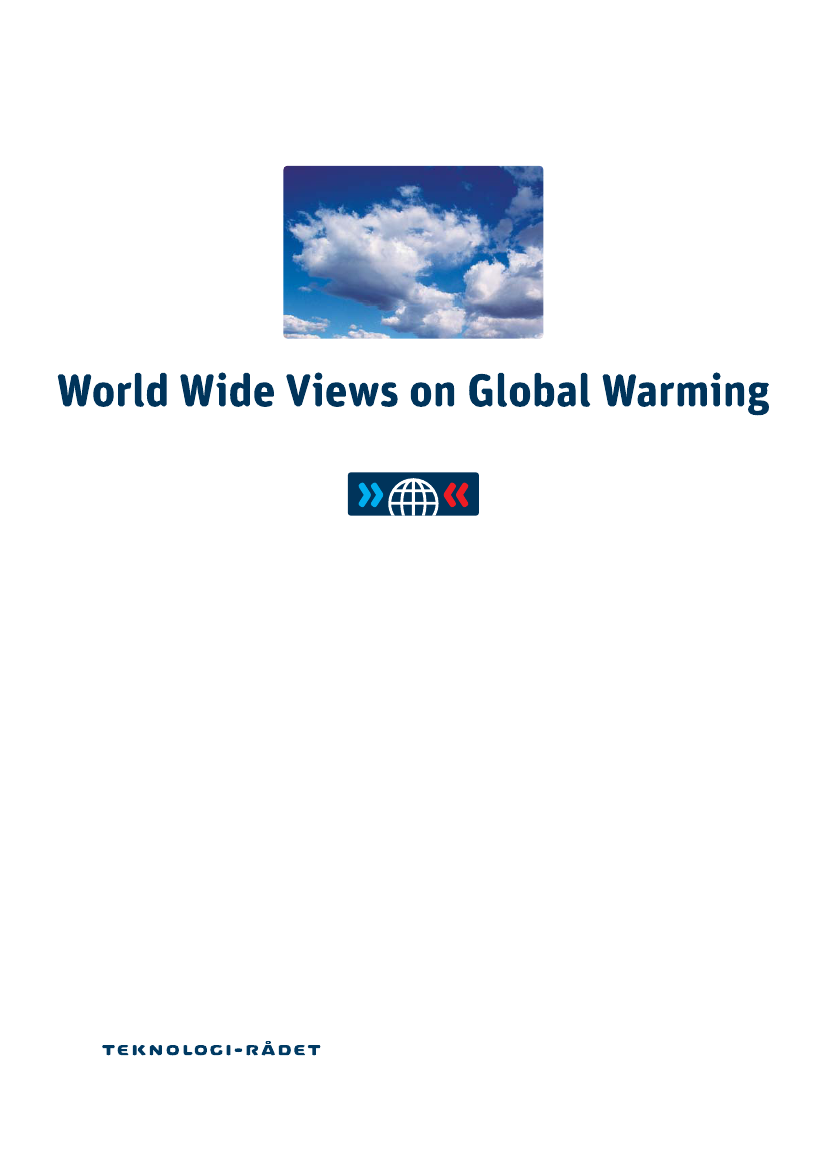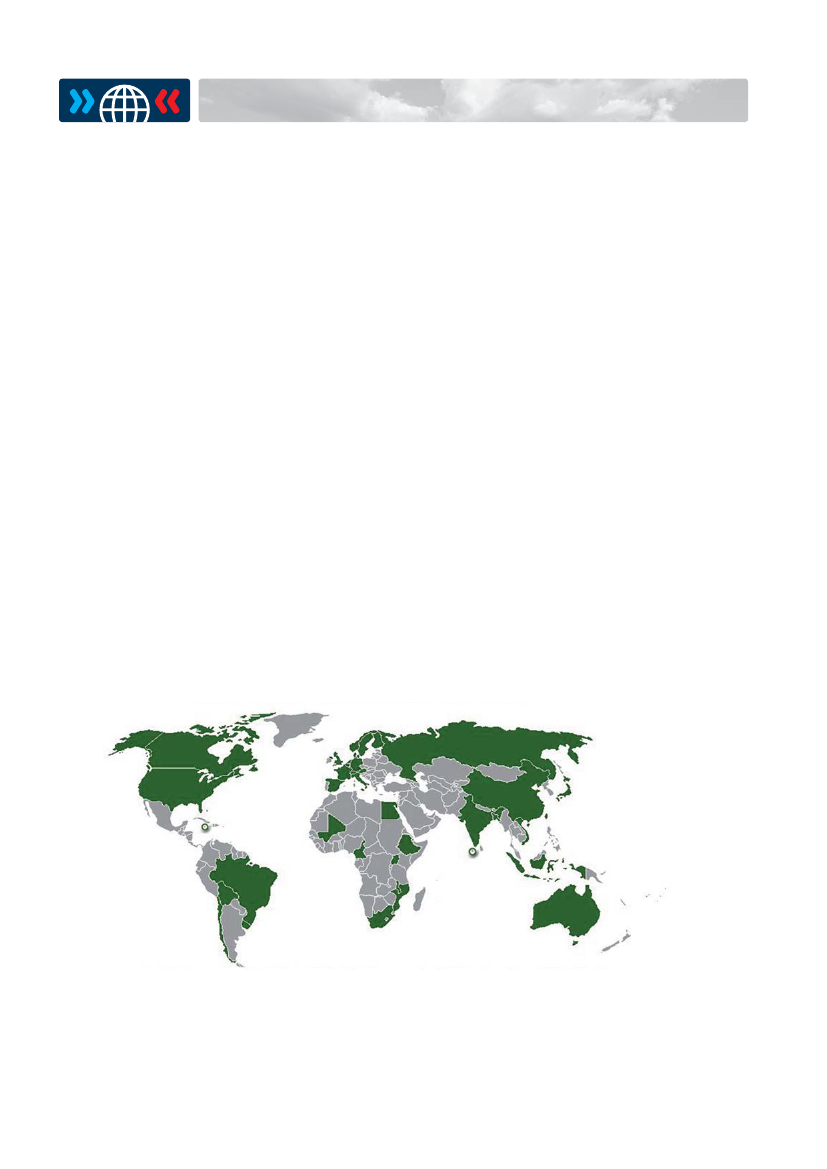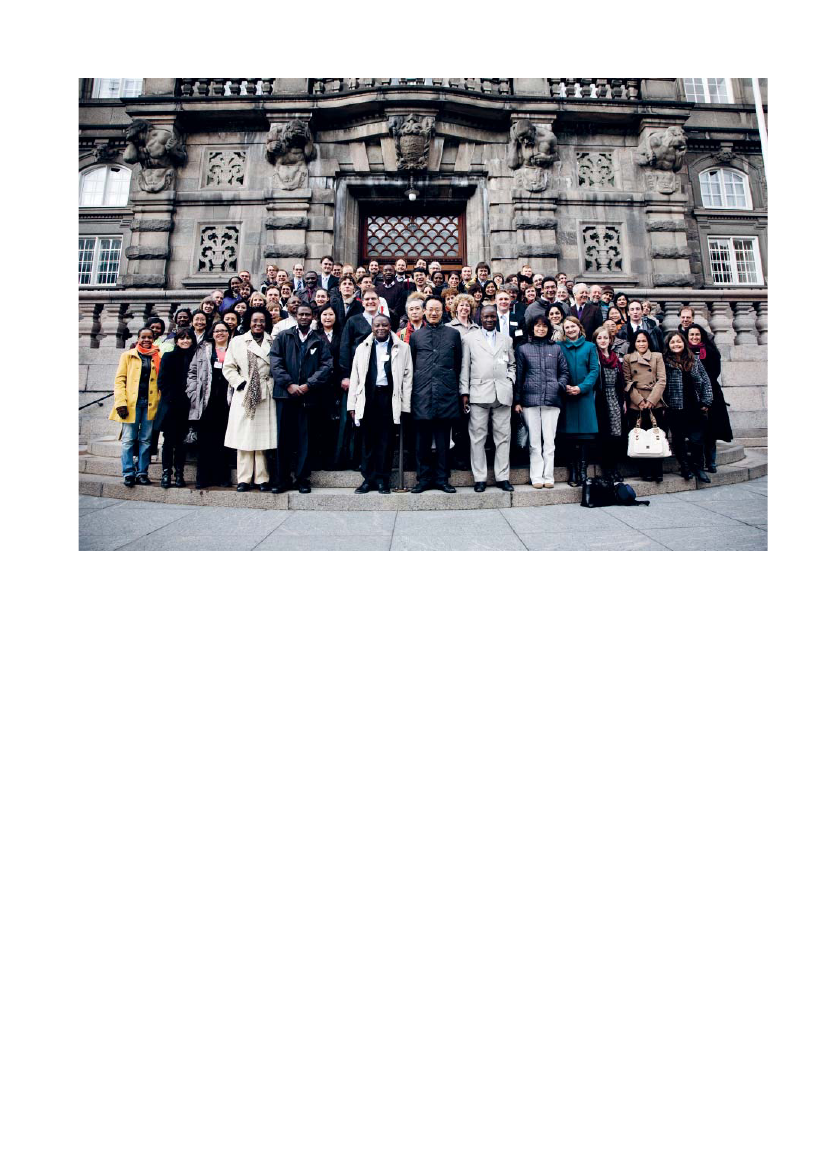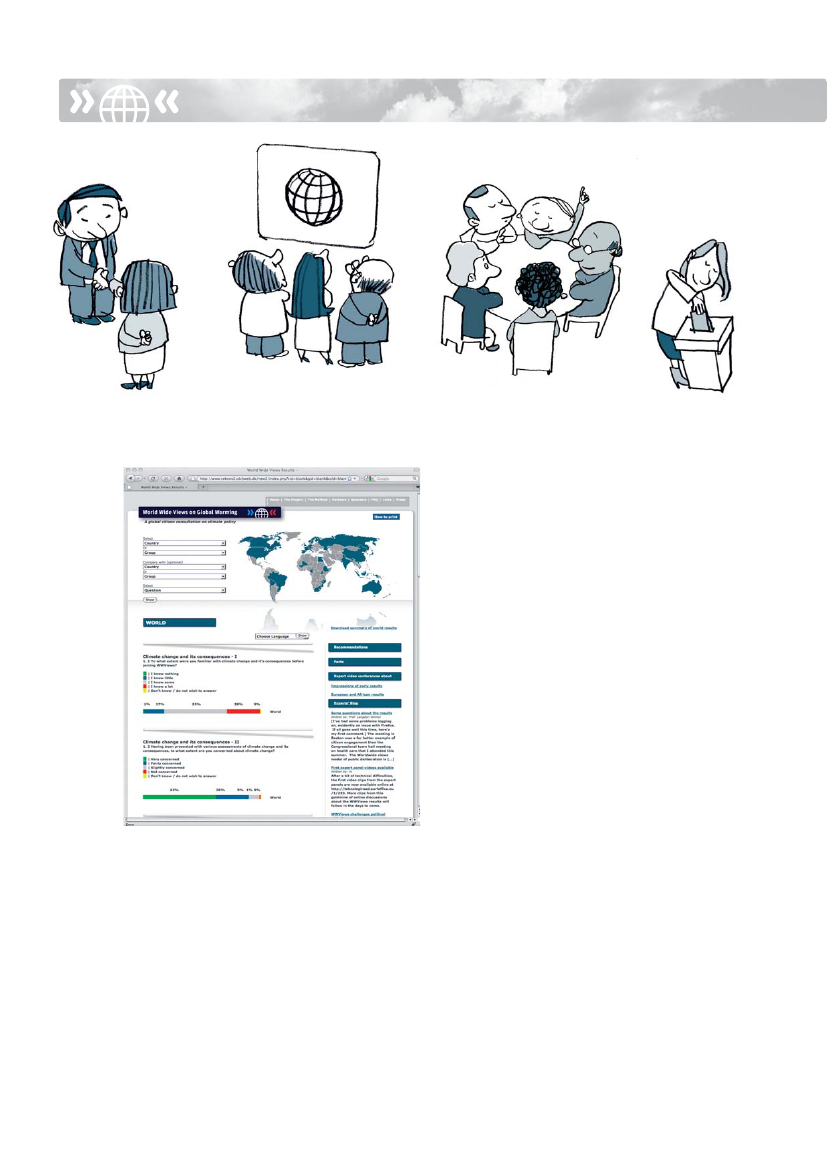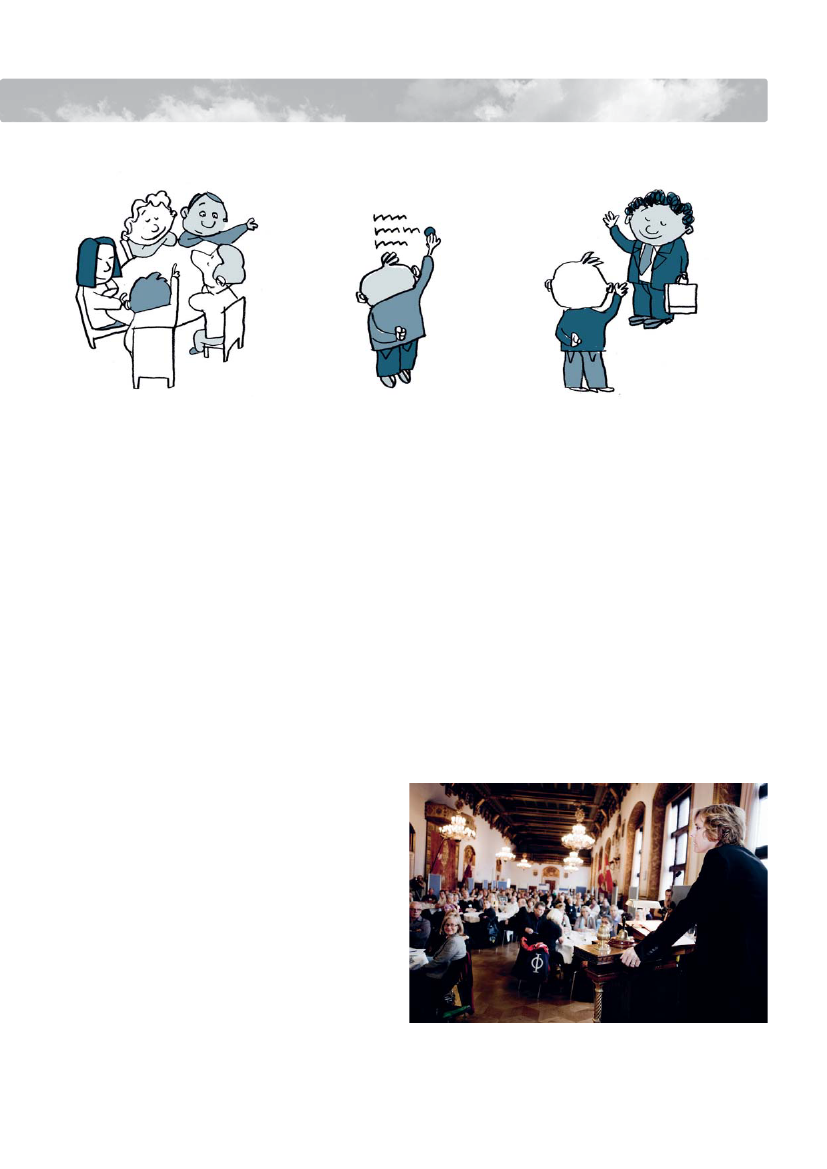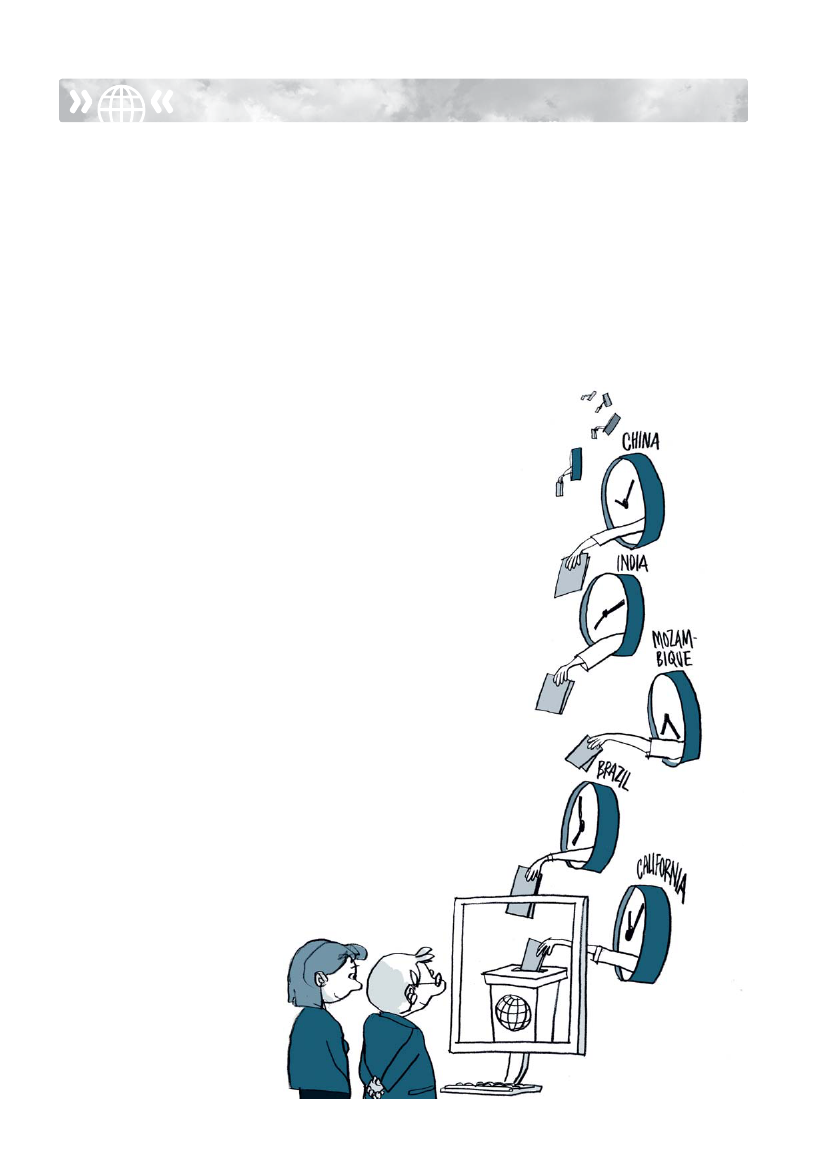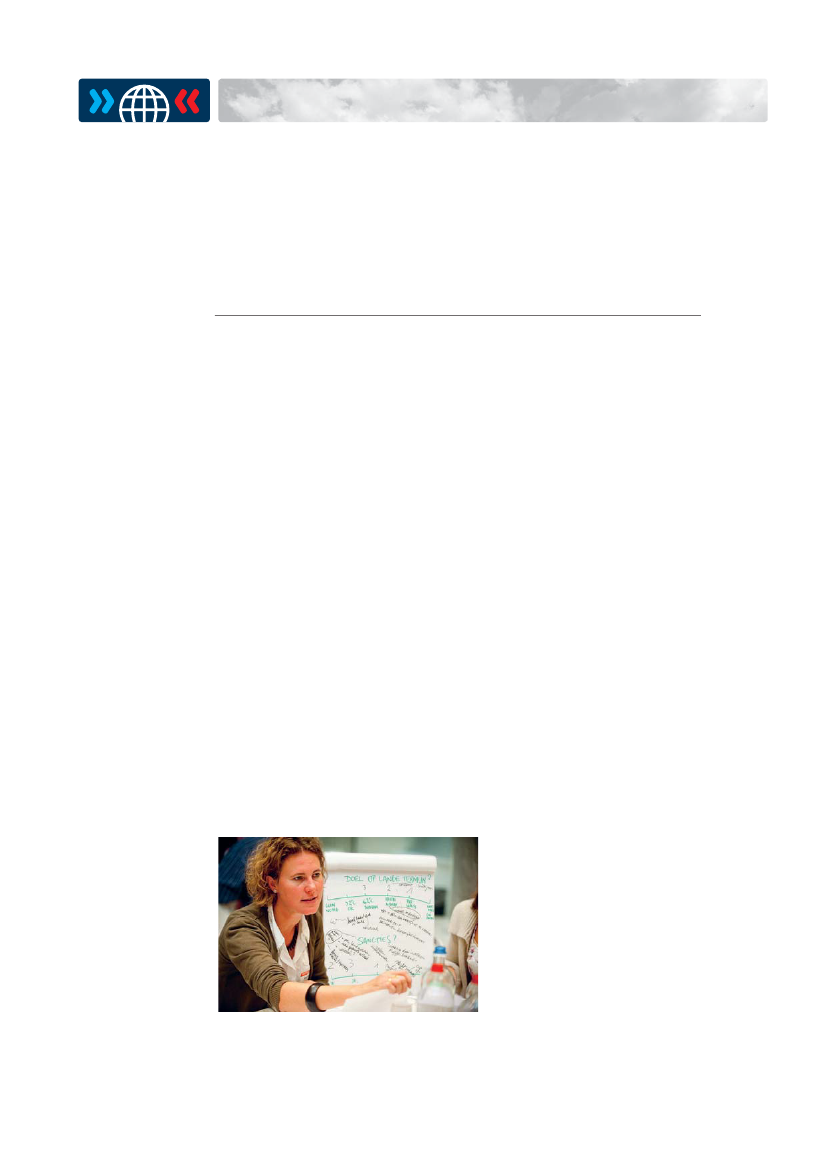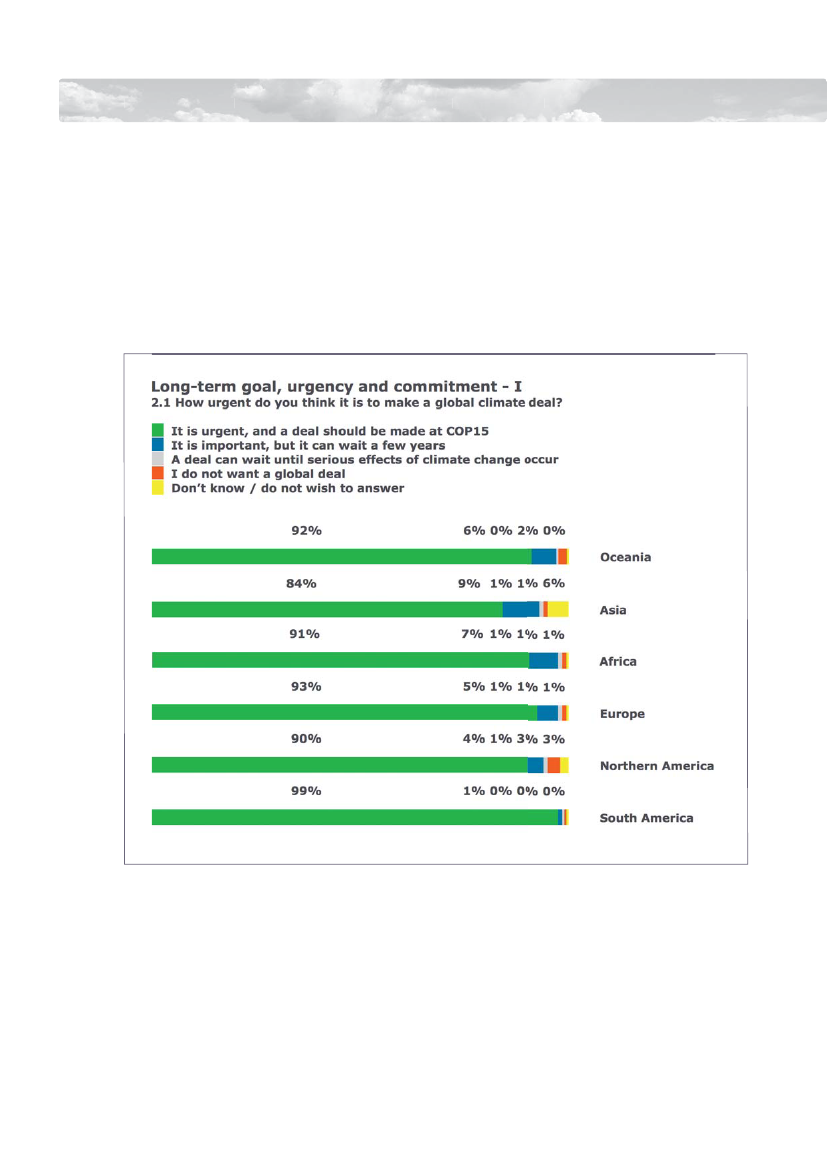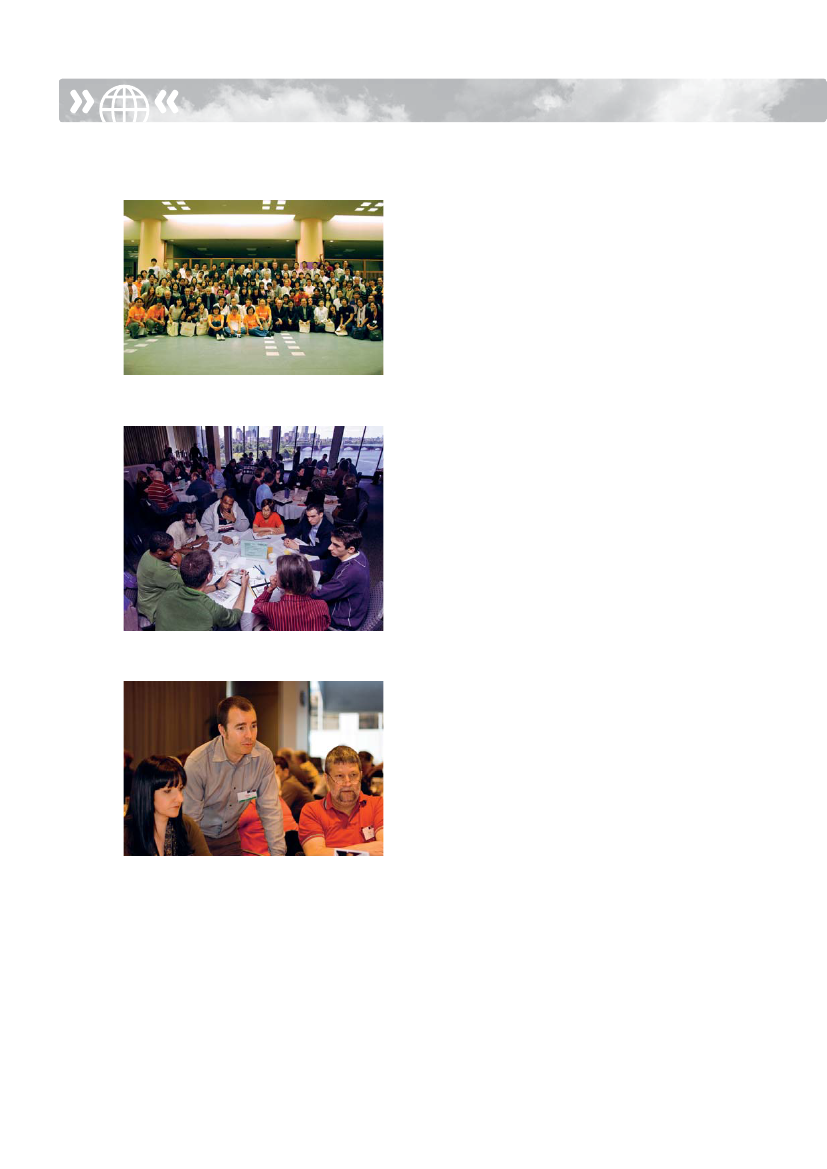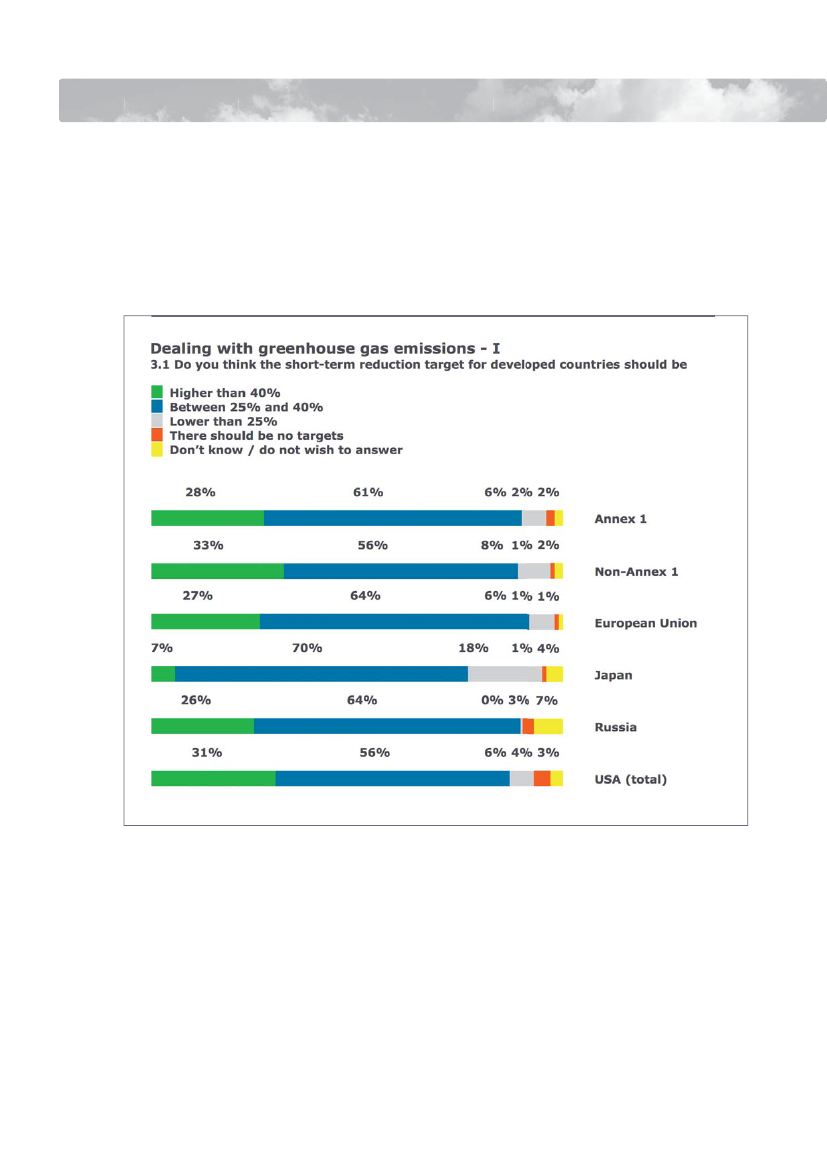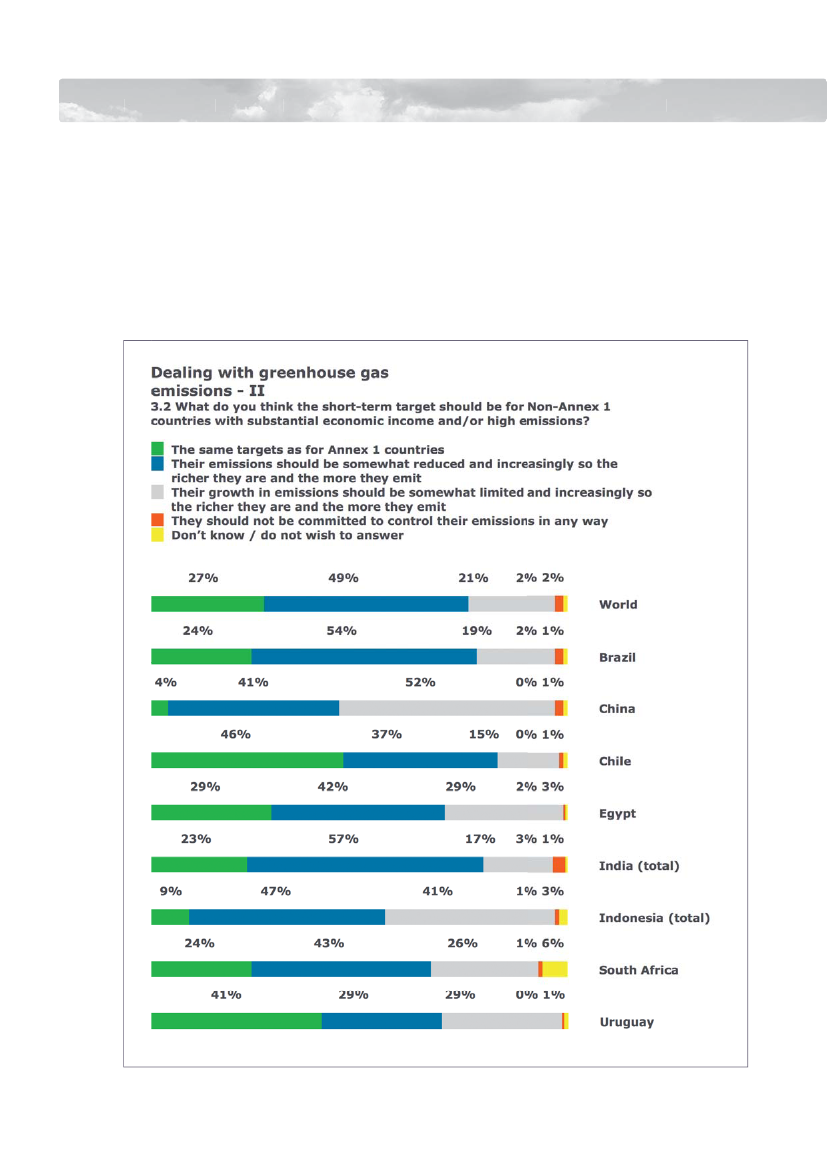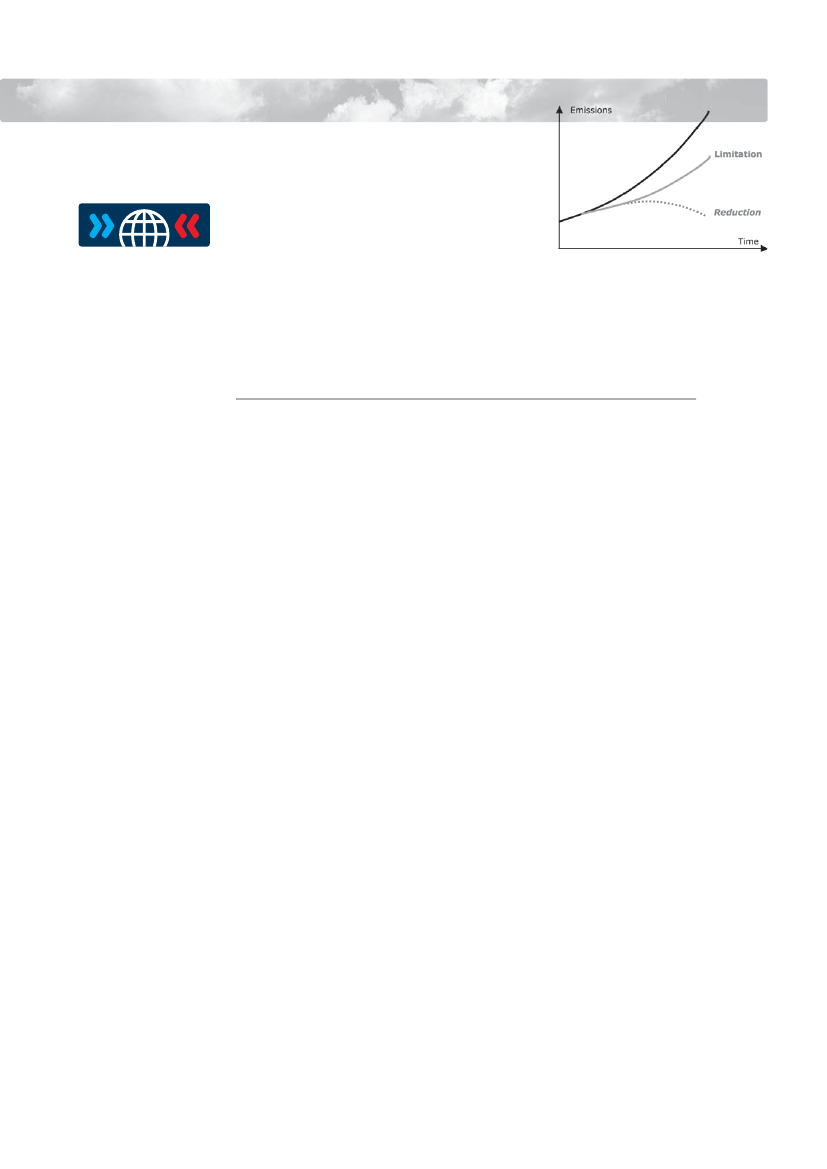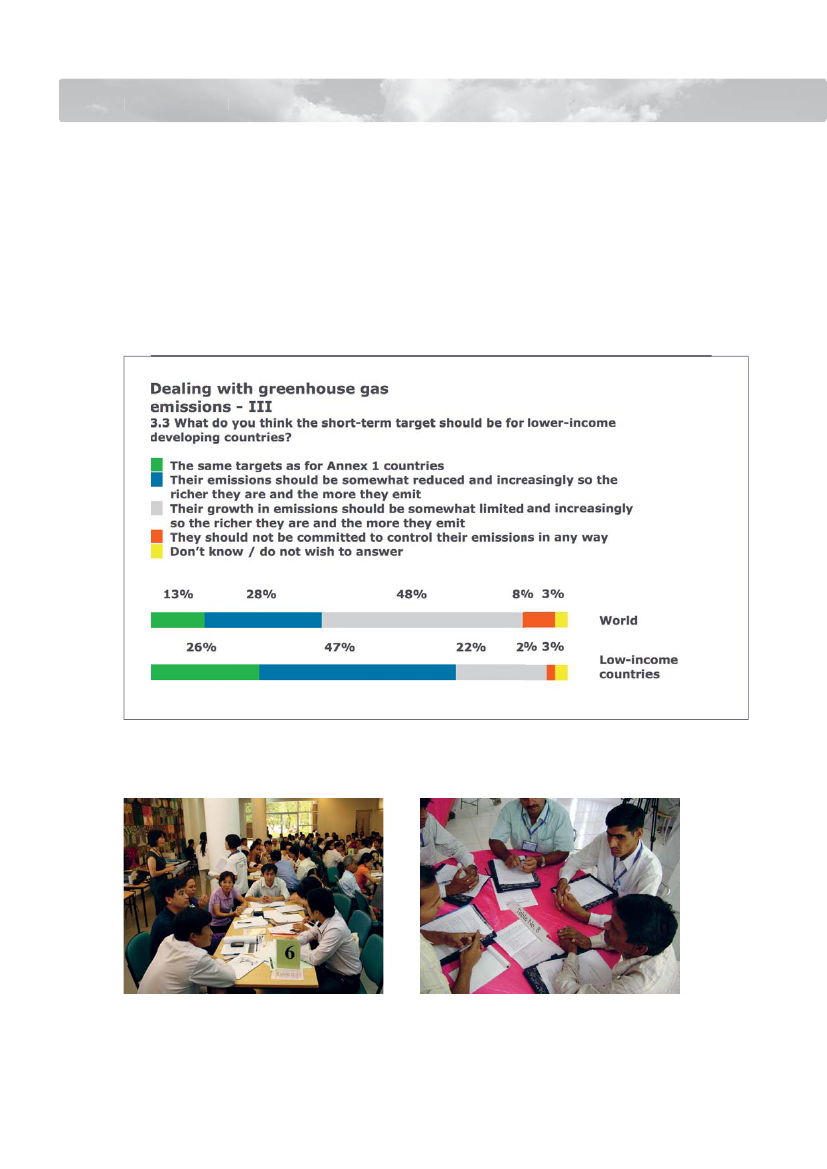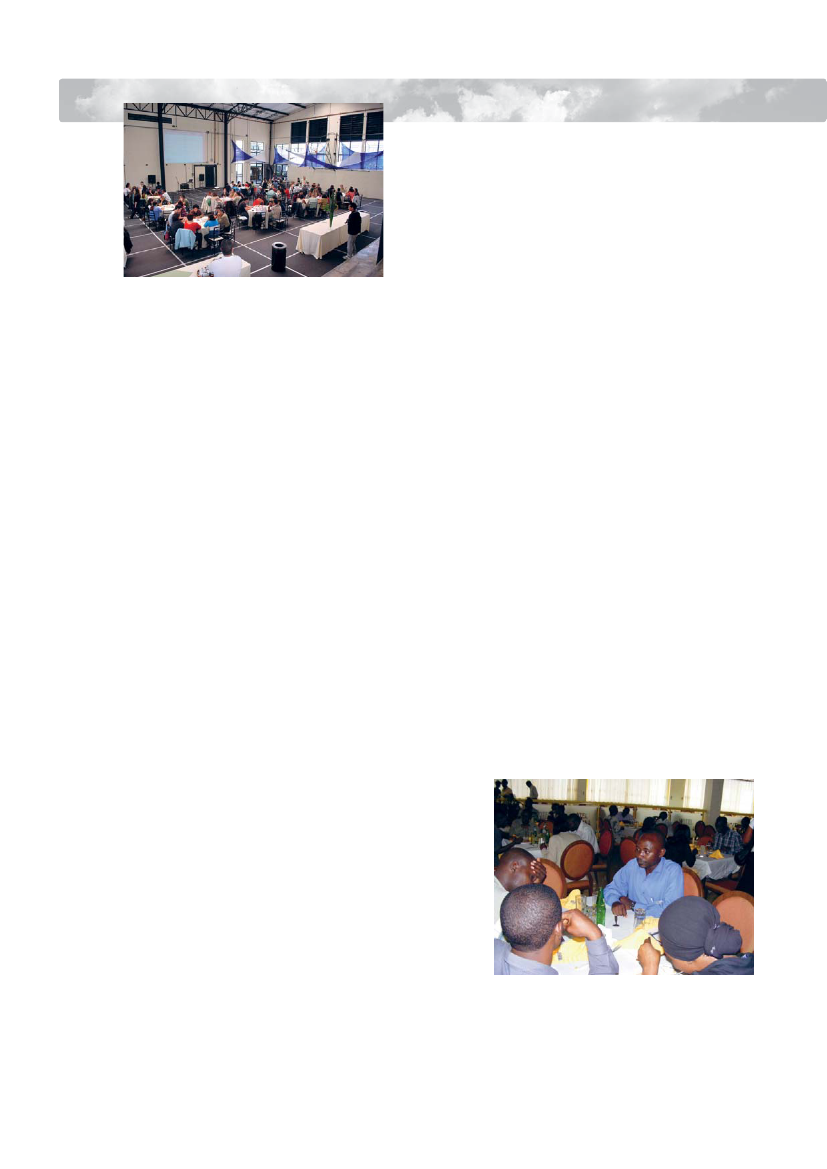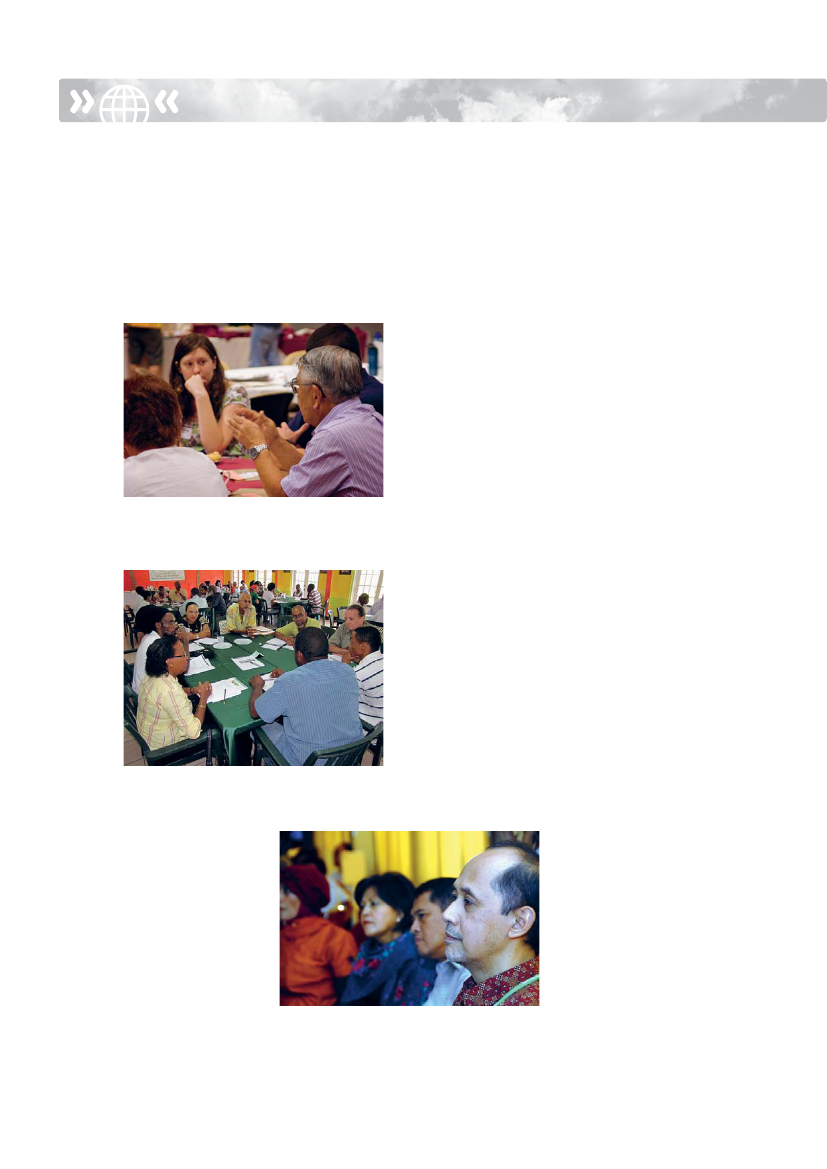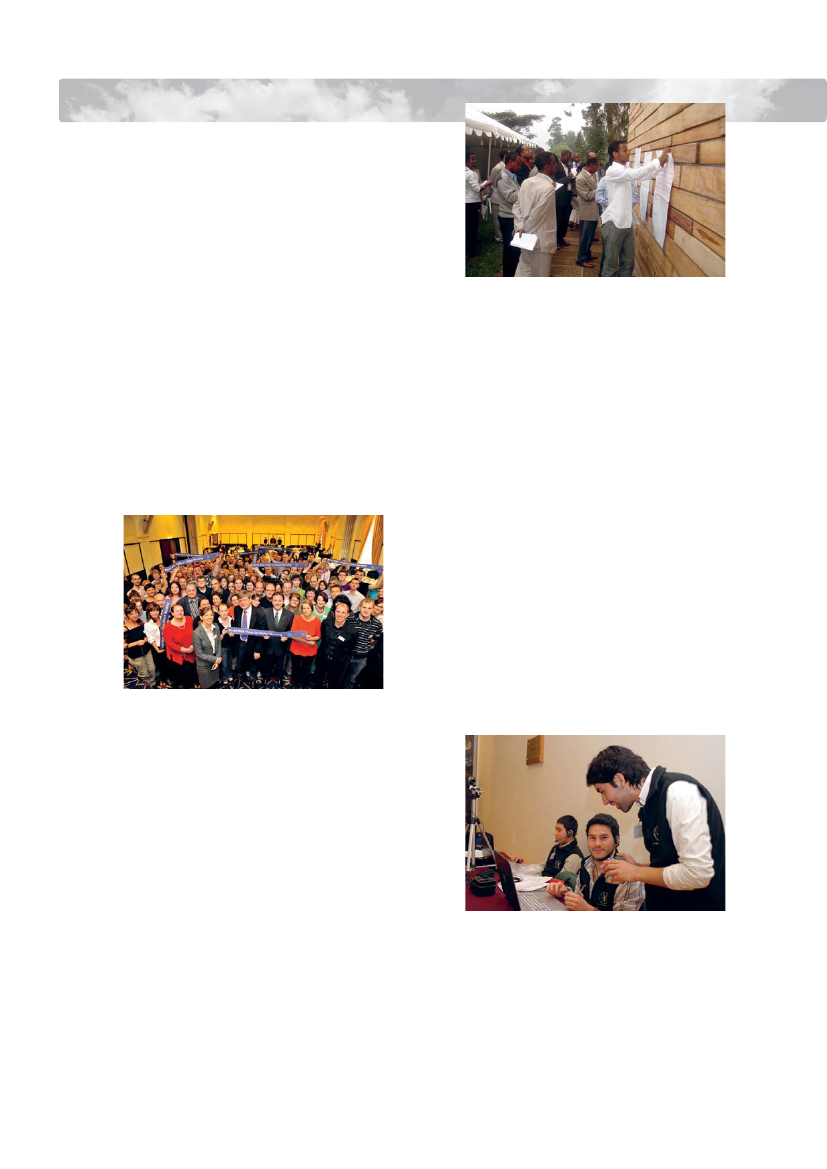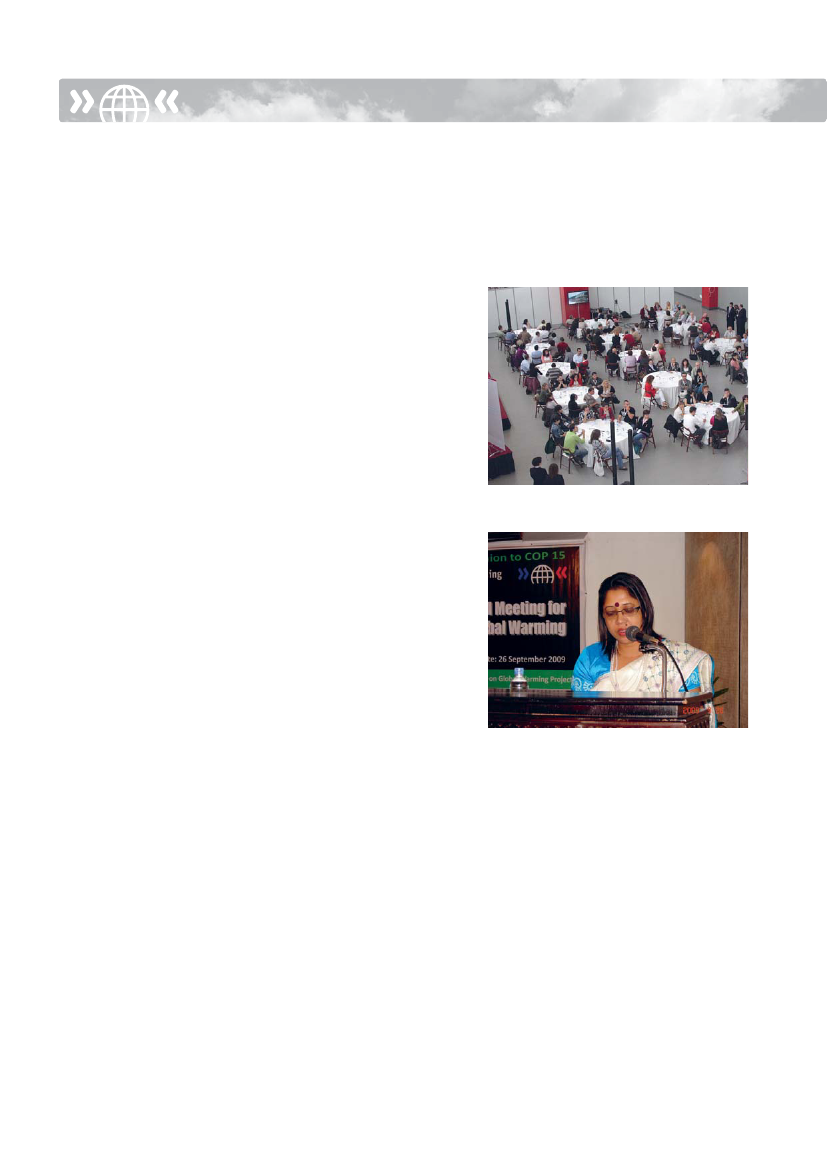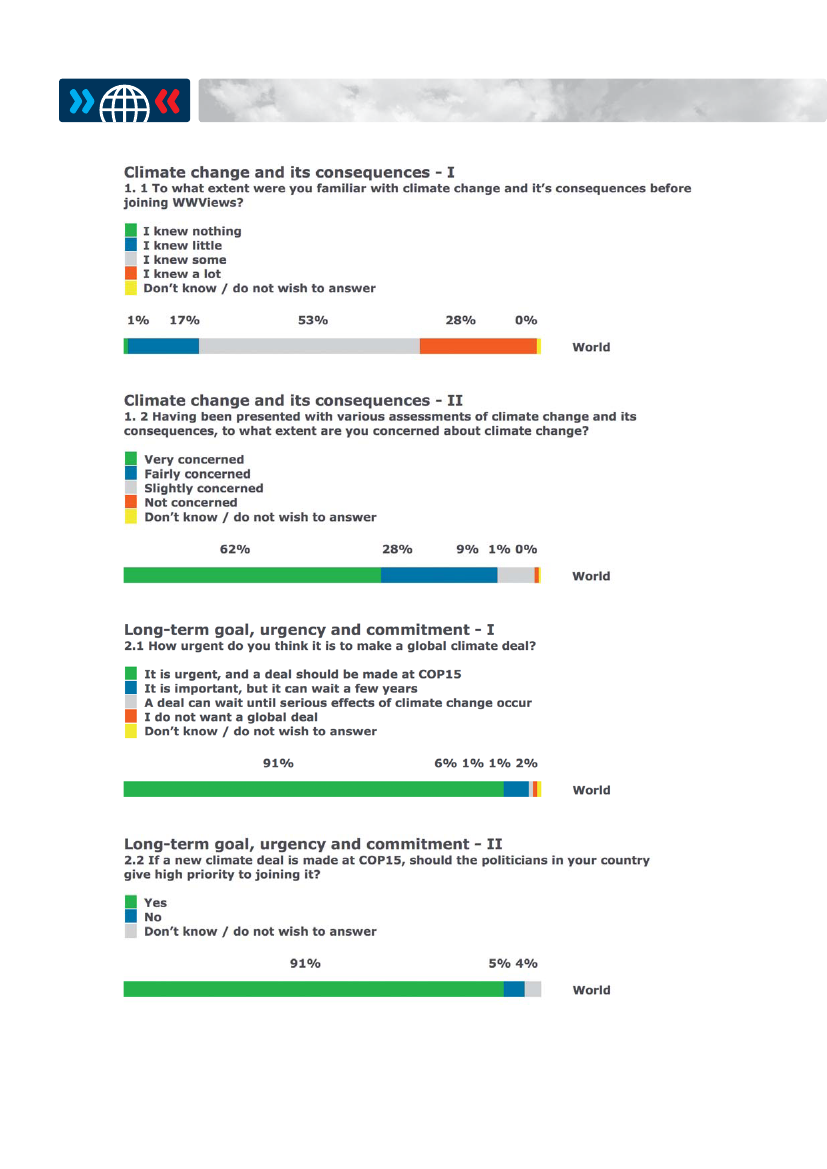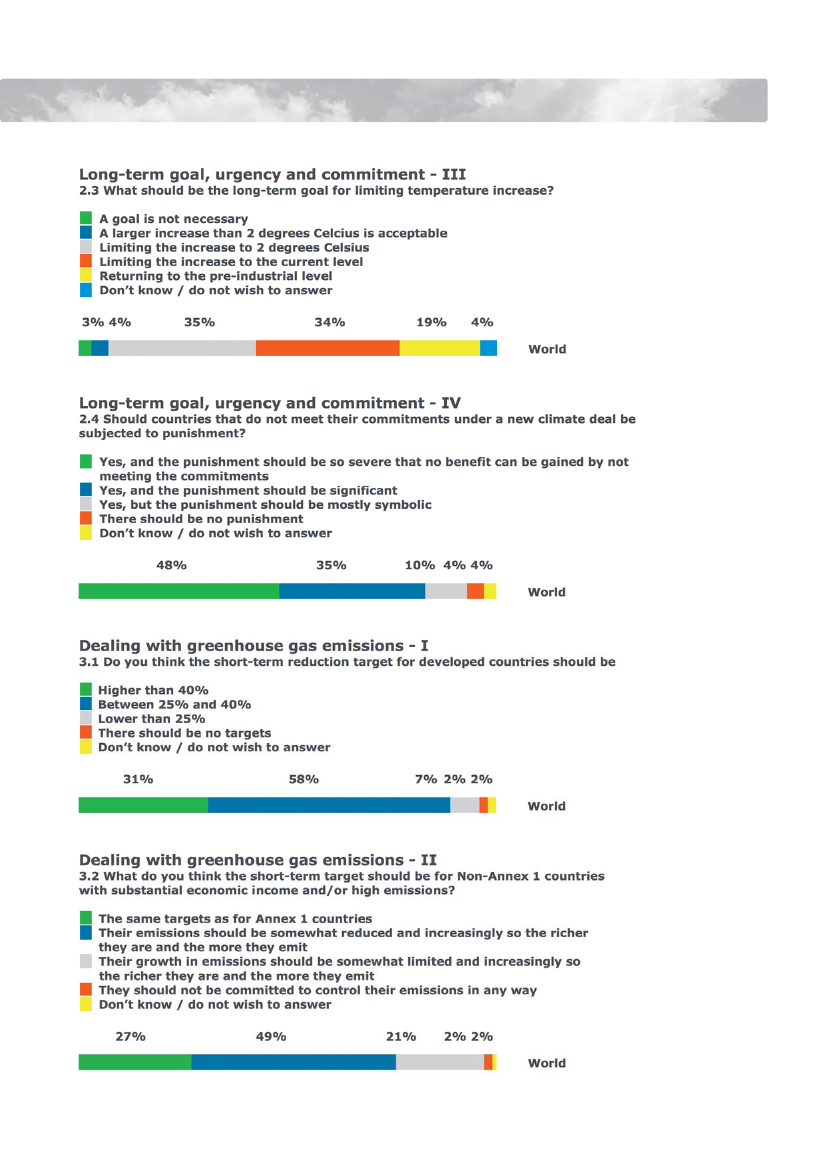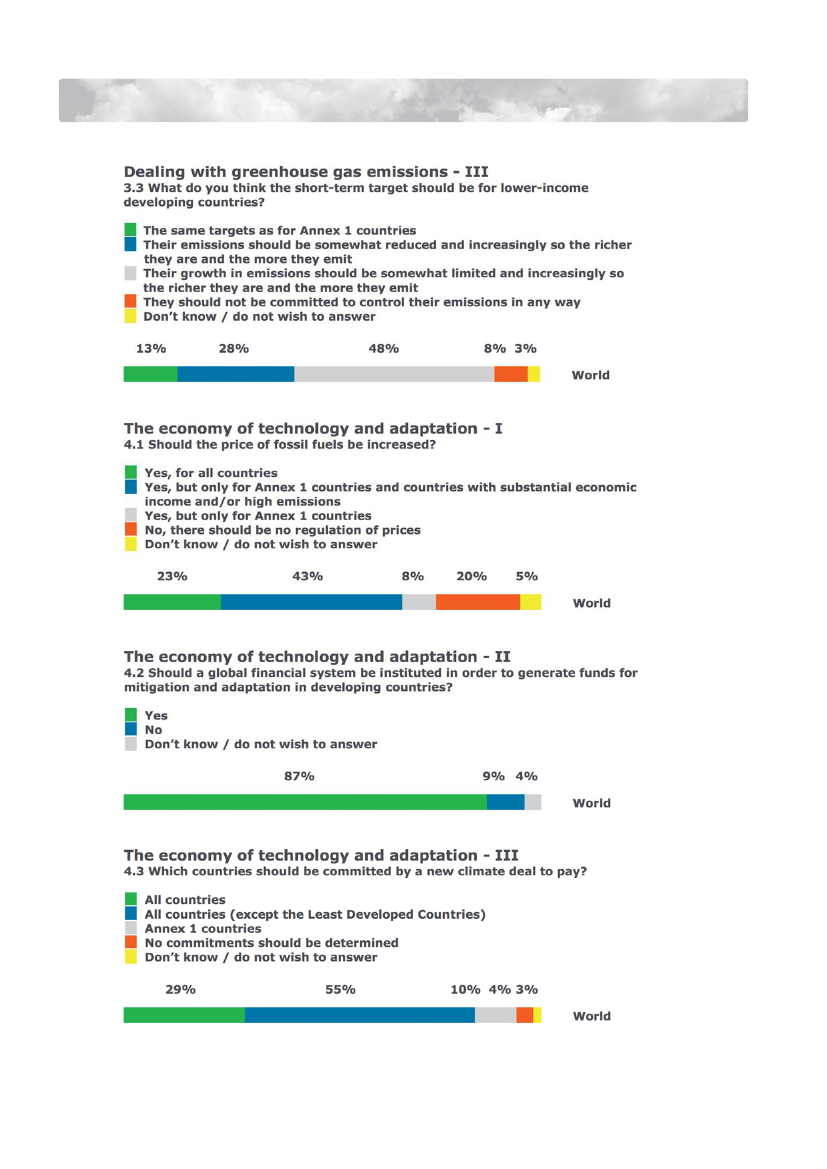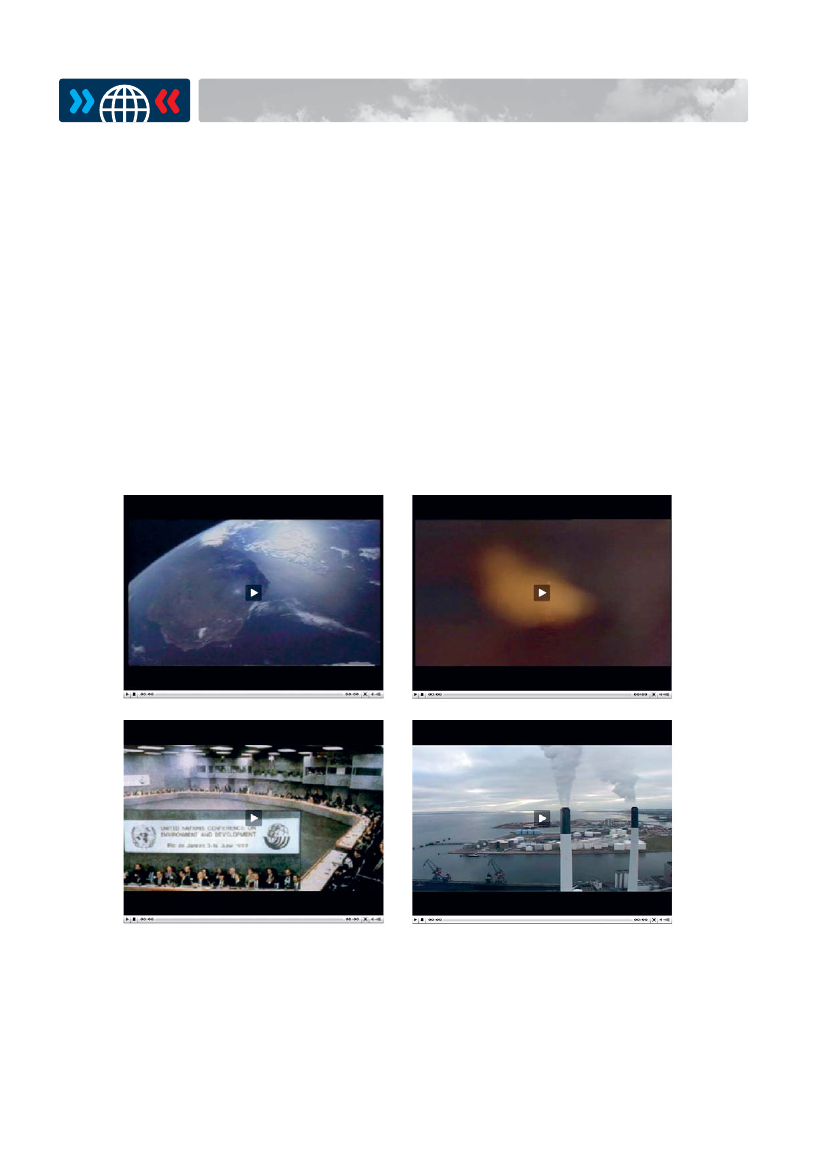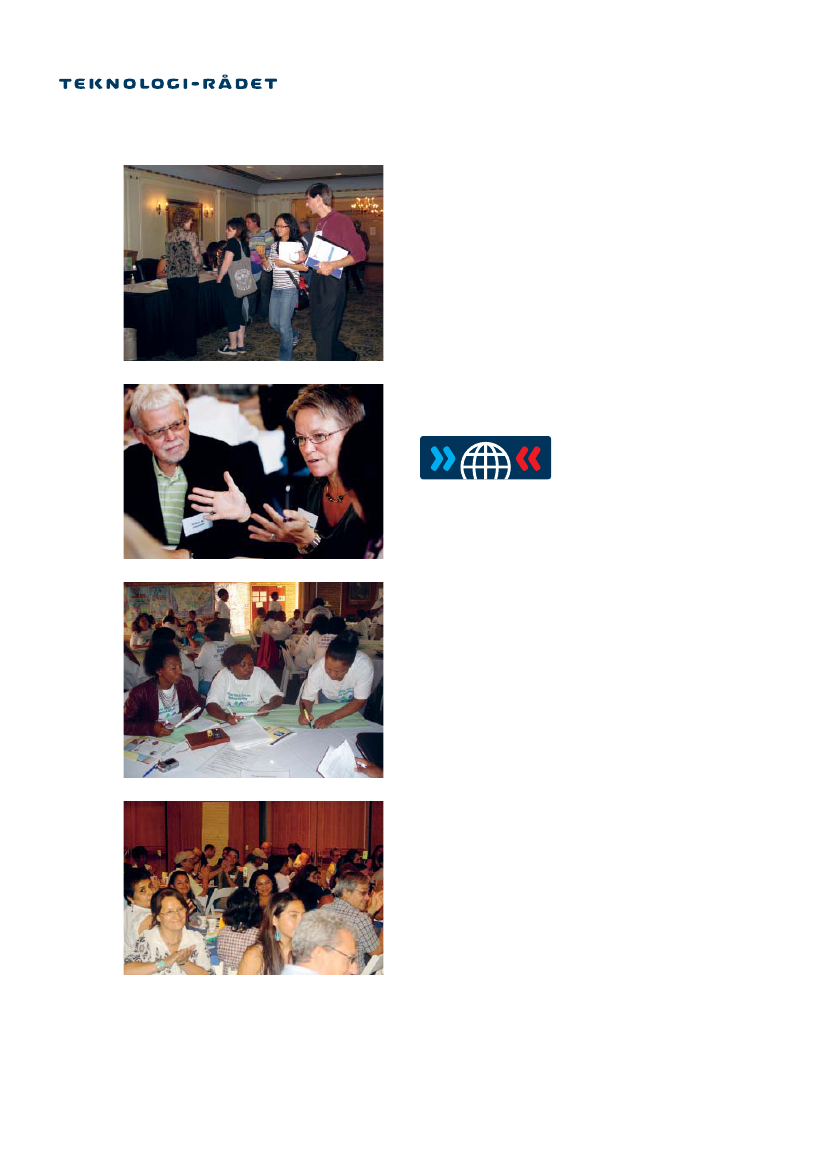Det Energipolitiske Udvalg 2009-10
EPU Alm.del Bilag 71
Offentligt
Policy report
FROM THE WORLD’S CITIZENS TO THE CLIMATE POLICY - MAKERS
TH E DAN ISH B OAR D OF TEC H NOLOGY
345113033
PrefaceExecutive summaryAbout World Wide Views on Global WarmingPolicy recommendationsWorld results graphicsList of national and regional partners
This Policy Report is published by the Danish Board of Technology, thecoordinator of World Wide Views on Global Warming (WWViews). Ithas been prepared based on input from WWViews partners and withspecial help from the following experts and WWViews partners:●●●●●●●●●
WWViews could not have succeeded without theexemplary efforts made by the WWViews partnersand the support of their national sponsors. We areespecially grateful to the Ministry of Foreign Affairsof Denmark, the Norwegian Ministry of ForeignAffairs and DNV (Det Norske Veriats, Norway), whosedonations made the global coverage and scope ofWWViews possible. Thank you also to the DanishCultural Institute, which has taken part in initiatingWWViews, building up the network and assistingWWViews partners in their fundraising efforts. Ofcourse, very special thanks go to the4,000citizensaround the world who participated in WWViews.The publication of the Policy Report has beensupported by the Swedish Ministry of theEnvironment.
Mr. Edward ANDERSSON, Involve, UKMs. Hoda BARAKA, Care EgyptMr. Jon FIXDAL, Norwegian Board of TechnologyMr. Sho KASUGA, Osaka University, JapanMr. Naoyuki MIKAMI, Hokkaido University, JapanMr. Torben Hviid NIELSEN, University of Oslo, NorwayMr. Irendra RADJAWALI, DML IndonesiaMr. Mikko RASK, National Consumer Research Center, FinlandMr. Richard SCLOVE, Loka Institute Founder and Senior Fellow, USA
World Wide Views on Global WarmingFrom the world’s citizens to the climate policy-makersPolicy ReportPublished by The Danish Board of Technology,November2009Editors: Bjørn BEDSTED & Lars KLÜVER,The Danish Board of TechnologyISBN978-87-91614-52-1Photo: WWViews partnersllustration: [email protected]Design: Søren MaarbjergThis Policy Report is available for download atwww.wwviews.org
WWViewsc/o TeknologirådetThe Danish Board ofTechnologyAntonigade4DK-1106 Copenhagen KPhone: +4533320503
POLICY R EPORT
¶
W O R L D W I D E V I E W S O N G L O B A L WA R M I N G
PREFACE
World Wide Views on Global Warming(WWViews) is the first-ever, globe-encompassing democratic deliberation.It focuses on what has been calledthe biggest common challenge formankind: global warming.
A
s markets, technologies and environmental issuesbecome increasingly global in scale, so doespolicymaking. In this new reality, the distance betweencitizens and policymakers increases, thereby diminishingthe citizens’ sense of ownership in decision-making. Thiscreates a need for new initiatives to bridge the wideningdemocratic gap.
Global warming requires global policymaking. Despitethis, climate policy debates have to a large extent beenlimited to scientists, politicians and powerful interestgroups, further widening the gap between citizens andpolicymakers.Citizens have to live with the consequences of climatepolicies. Their views should therefore be taken intoconsideration. Policies determined at COP15 will meanthat citizens will have to invest in new technology,develop new consumer patterns, modify their housesand even their livelihoods. They are more likely toaccept and implement such policies if they have beenconsulted and listened to first.Until now, no systematic and in-depth global citizenconsultancy on climate change has been organized.WWViews fills this void and establishes a model for thefuture inclusion of the world’s citizens in global policymaking. The novel and practical project design makes itpotentially possible for all nations on Earth to take partand to produce comparable results that can be clearlycommunicated to policy-makers.World Wide Views on Global Warming involvedroughly 4,000 citizens in 38 countries spanning sixcontinents. The citizens gathered in their respectivenations to deliberate about the core issues at stake inthe December 2009 UN negotiations on climate change.They received balanced information about climatechange, discussed with fellow citizens and expressedtheir own views. They did so in daylong meetings onSeptember 26, 2009.This report summarises their answers and presentssome of the most significant results, which can bestudied in greater detail at www.wwviews.org. It isaimed at policy-makers with previous knowledgeabout climate issues, and written by the WWViewscoordinators in cooperation with the 44 nationalpartners and the assistance of an expert workshop.We expect political decision-makers to carefullyconsider the views of the citizens when formulatingthe climate policy for the future, in Copenhagen andbeyond.November 2009Bjørn BEDSTED, WWViews CoordinatorLars KLÜVER, WWViews President
F R O M T H E W O R L D ’ S C I T I Z E N S TO T H E C L I M AT E P O L I C Y- M A K E R S
3
EXECUTIVE SUMMARY
R
esults from the first-ever global citizens’consultation on climate change are clear:Citizens from all parts of the world mandate theirpoliticians to take fast and strong action at COP15.
●●●
Make a deal at COP15Keep the temperature increase below 2 degreesAnnex 1 countries should reduce emissionswith 25-40 % or more by 2020Fast-growing economies should also reduceemissions by 2020Low-income developing countries should limitemissionsGive high priority to an international financialmechanismPunish non-complying countriesMake technology available to everyoneStrengthen or supplement internationalinstitutions
The WWViews results are based on well-established principles for citizen participation,and offer a unique and detailed insight intoordinary people’s views on climate change andhow to make global policies to deal with it. The4,000 participating citizens from 38 countrieswere chosen to reflect the demographic diversityin their respective countries and regions. Theywere provided with unbiased information aboutclimate change and the COP15 negotiations, andthey were given time to deliberate with fellowcitizens.The results are remarkably consistent acrossnational income groups and geographical regions.The participating citizens voted on alternativeanswers to 12 predefined questions andproduced a large number of recommendationsphrased in their own wordings. Synthesizingthese results, we can deduce nine clear PolicyRecommendations from the citizens. Therecommendations are:
●
●
●
●●●
WWViews results can be studied in detail atwww.wwviews.org
On September26, 2009the first WWViews meeting started at9am in Australia.The last one finished36hours later in USA, California.38countries participated.
4
POLICY R EPORT
¶
W O R L D W I D E V I E W S O N G L O B A L WA R M I N G
ABOUT WORLD WIDE VIEWS ON GLOBAL WARMING
Inasmuch as citizenswill have to live with thedecisions made at COP15,it would only be fair toconsult them during thepreparations.
EGYPT
MOZAMBIQUE
The timeline
Late2007
The ideaLate20072008
The idea
Early2008and onwards2008– May2009
The WWViews designSelecting the partners
Mid2008and onwards
Questions andinformation materialfor the citizens
Late2008and onwards2009
The web tool
The Danish Board of Technology developed theidea for WWViews as a response to the emergingdemocratic gap between global policy makersand citizens, as more decisions become globalin scale. The Danish Board of Technology has along tradition of involving ordinary citizens inpolitical decision-making processes nationally andon a European scale. No one has done so beforeon a global scale and COP15 seemed to be a goodopportunity, since expectations were buildingup to sealing a new climate deal in Copenhagen.Also, there was a clear need to involve ordinarypeople in a debate otherwise heavily dominatedby scientists, politicians and powerful interestgroups.Inasmuch as citizens will have to live withthe decisions made at COP15, it would only befair to consult them during the preparations.Furthermore, if a new climate deal is going tobe implemented successfully, it requires theacceptance and cooperation of citizens worldwide.In democratic and functional terms, a new dealwill not work effectively if it does not enjoysupport from a large majority of the world’spopulation.
May – August2009
Selectingthe participatingcitizens
September26, 2009September26and onwards
WWViews DayMaking the citizens’views heard
F R O M T H E W O R L D ’ S C I T I Z E N S TO T H E C L I M AT E P O L I C Y- M A K E R S
5
Early2008and onwards
The WWViews designThe cornerstones of the WWViews method werelaid down at an early stage in a workshop with thefirst WWViews partners. The design of WWViewswas developed in response to the practicalchallenges the partners faced:●
Cheap and easy: The method had to be feasiblefor potentially all countries in the world toparticipate, regardless of financial income andgeneral education level.Clear link to policy-making: It had to addressissues of immediate relevance to policy-makers.Both global and national: It had to be salient toboth national and global decision-making.Clear and comparable results: Results had to becomparable across countries and regions andthey had to be easy to communicate to policy-makers.Informed citizens: Citizens had to be providedwith the balanced information necessary inorder to understand the issues debated.Deliberation: Citizens should be given theopportunity to discuss their views with eachother before defining their own standpoints.Qualitative and quantitative: The citizensshould have opportunity to phrase theirown recommendations as well as voting onalternative answers to predefined questions.
opinion polls, the WWViews method providesrespondents with balanced and scientificallybased information, as well as an opportunityto deliberate for a full day with other citizensprior to rendering their judgements. It thusallows for more detailed questions and well-considered responses, and the WWViews resultscan be interpreted as a leading indicator for whatconventional opinion polls will likely find in thefuture, as populations gradually learn more aboutclimate change.
2008– May2009
●
Selecting the partnersThe WWViews national partners have beenresponsible for organizing WWViews meetings intheir respective countries or regions. To becomepartners they should preferably●
●
●
have some experience with citizenparticipation methodsbe unbiased with regards to climate changebe able to follow the common guidelinesself-finance their participation in WWViews
●
●●●
●
●
On this basis, it was decided to have large groupsof citizens (roughly 100) meet in each of theirrespective countries or regions to deliberate on anidentical set of questions, using identical meetingdesigns, and then connect these meetings andtheir results through web technology.The WWViews method differs in importantways from conventional opinion polls. Althoughthe sample size of 100 per country or regionsomewhat limits the national statistical validityof the results, it is nonetheless large and diverseenough to give a sense of general trends innational and international opinions. Unlike
Contacts were made to established networks thathelped distribute the call and to identify potentialpartners. In the end, over 50 partners joinedforces to arrange 44 deliberations in 38 countriesspanning six continents. The partners typicallyinclude public councils, parliamentary technologyassessment institutions, non-governmental civilsociety organizations and universities. Mostpartners were self-financed but several partners,especially from developing countries, receivedsupport from sponsors. Despite high motivation,several potential partners were not able to join,due to lack of financing. Had additional fundingbeen available, the global coverage of WWViewsthus could have been significantly expanded.The WWViews partners include a dozen countries,most of them in the developing world, wherethere is practically no previous information oncitizen views on climate change and climatepolicy.
6
POLICY R EPORT
¶
W O R L D W I D E V I E W S O N G L O B A L WA R M I N G
Project managers from around the world in front of the Danish Parliament in March2009,where WWViews was officially launched.
Mid2008and onwards
Questions and informationmaterial for the citizensThe questions put to the citizens worldwidewere chosen to be of direct relevance to theCOP15 negotiations. They had to be identical inall countries in order to allow for cross-nationalcomparisons. To ensure clear communicationto policy-makers, the questions were predefinedwith alternative answer options. The 12 questionschosen were clustered in 4 themes:●●●●
An information booklet of 40 pages was producedwith background information about climatechange (drawing on IPCC’s fourth assessmentreport) and the COP15 negotiation issues.Information videos (each 5-12 minutes long) weremade for each of the four themes, repeatingthe most essential information available in thebooklet and ensuring that all citizens wouldparticipate in the meetings with the necessaryinformation. All WWViews information materialwas translated into local languages.In some countries, WWViews partners decided togather the citizens the day before the meeting inorder to allow time to familiarize themselves withthe information material.The questions and information material weredeveloped in close cooperation between theWWViews partners. An international scientificadvisory board was responsible for assuring thequality of the material, and it was also tested byfocus groups in different parts of the world beforecompletion.
Climate change and its consequencesLong-term climate goal and urgencyDealing with greenhouse gas emissionsThe economy of technology and adaptation
To compensate for the restricted format ofpredefined questions, it was decided to also allowtime for the citizens to formulate and vote ontheir own recommendations.
F R O M T H E W O R L D ’ S C I T I Z E N S TO T H E C L I M AT E P O L I C Y- M A K E R S
7
Welcome to WWViews Day
Information videos
Deliberation in groups
Voting after each thematic session
March23-25, 2009
Training seminarMost of the project managers from the WWViewsnational partner institutions met in Copenhagenhalf a year prior to WWViews Day for a trainingseminar. The purpose of the seminar was toensure a common understanding of the project,uniformity of method implementation andprocedural solutions for culturally specificchallenges. Partners joining WWViews later thanthis date came to Copenhagen for individualtraining sessions.
May – August2009
Selecting the participatingcitizensGuidelines for selecting the participating citizenswere made in order to ensure the reliabilityof the results: The citizens at each meetingshould reflect the demographic distributionin their country or region with regards to age,gender, occupation, education, and geographicalzone of residency (i.e. city and countryside). Afurther criterion was that they should not beexperts on climate change, neither as scientistsnor stakeholders. Where appropriate, nationalpartners added additional demographic criteria,which were relevant to their national context; forexample race or ethnic groups.Based on reports from the partners, the guidelineshave been followed, albeit with some localvariation due to economic or practical limitations.
Late2008and onwards
The web toolA special web tool was designed for the purposeof near-instant collection and presentation of theresults from the WWViews meetings. The toolallows for statistical presentation and comparisonof results between countries/regions and variousinternational groupings (i.e. continents, Annex1 countries, non-Annex 1 countries, low incomecountries, high income countries). It can be foundat wwviews.org.
8
POLICY R EPORT
¶
W O R L D W I D E V I E W S O N G L O B A L WA R M I N G
New deliberations
Writing recommendations to COP15
Goodbye and thank you for participating
A tendency towards under-representation of thelowest educated can be seen in many countries.Some countries ended up with fewer than 100citizens (a few considerably lower). Some countriesor regions recruited citizens from their entiregeographical area, whereas others recruited froma smaller area in order to cut expenses.The sample of citizens consulted in WWViews is,however, large and diverse enough to give a senseof general trends in national and internationalpublic opinion.
Some countries arranged to link up via Internetvideoconferences. Others presented pictures andresults from other countries to their participants.
The meetingAll meetings followed the same schedule: The 100citizens, divided into tables of 5-8 people, wereled by a head facilitator and group moderatorsthrough a programme divided into four thematicsessions and a recommendation session.During the thematic sessions, citizens voted onalternative answers to a total of 12 questions, thusmaking international, quantitative comparisonspossible. Each thematic session was introducedby the facilitator and an information video.
September26, 2009
WWViews DayThe worldOn September 26, 2009 the first WWViewsmeeting started at 9 am in Australia. The lastone finished 36 hours later in California, USA. Asthe day progressed, citizens voted on alternativeanswers to the predefined questions and developedtheir own recommendations. These resultswere instantly reported on wwviews.org, so thatanyone with Internet access could – and they stillcan – compare answers to the various questionsacross countries, regions, political and economicgroupings, etc.An auto-generated summary of all the latestresults was also instantly available.Photos and videos from the various meetings werecontinuously uploaded to a media share server.Video interviews with citizens were made availableas well.
Connie Hedegaard, COP15 host and WWViews ambassador,at the Danish meeting.
F R O M T H E W O R L D ’ S C I T I Z E N S TO T H E C L I M AT E P O L I C Y- M A K E R S
9
The participants then engaged in moderateddiscussions at their tables, the purpose of whichwas to give all participants time to listen to otheropinions and reflect prior to voting. Moderatorswere trained in advance to provide un-biasedfacilitation at the tables. Each thematic sessionconcluded with citizens casting their votesanonymously on two to four questions. Votes werecounted first at the tables, then by the staff andimmediately reported to wwviews.org.During the recommendation session, citizenswrote in their own words what they believed tobe the most important recommendation to passon to COP15 negotiators. Each table producedone recommendation and all citizens then votedfor the ones from all the tables that they foundmost important, resulting in a prioritised list ofrecommendations, also reported to wwviews.org.Most meetings were either opened or closed byministers, COP15 negotiators or other governmentofficials.
»World Wide Views creates a unique possibilityto engage citizens from all corners of theworld in the process towards the UN ClimateConference in Copenhagen this December.It ensures that we politicians get a realitycheck on how citizens of the world think theagreement should be put together.«Connie Hedegaard, COP15 host and WWViews ambassador
September 26 and onwards
Making the citizens’ viewsheardThe target groups for receiving the WWViewsresults are politicians, negotiators and interestgroups engaged in the UN climate negotiationsleading up to COP15 and beyond. The WWViewsresults are especially significant for climatepolicy-makers because they reflect the informedand considered views of a broad range of citizensacross the world concerning the complex issues tobe addressed at COP15.In order to disseminate the views of the citizens,all national and regional WWViews partners havemade plans for how to reach these target groups.The goal is to make them aware of results andensure that they take them into consideration.
From the early start in Australia to thelate finish in California the many votesand recommendations were instantlyreported on wwviews.org and availablefor comparisons. They still are.
10
POLICY R EPORT
¶
W O R L D W I D E V I E W S O N G L O B A L WA R M I N G
POLICY RECOMMENDATIONS
The general answer:Fast and strong global policyReading across the votes and recommendationsfrom all participating countries, one impressionstands clear: The participating citizens mandate theirpoliticians to take fast and strong action at COP15.from all countries are willing to contribute. Thosecountries that do not live up to their commitmentshould be met with punishments. The citizenssee technology development and distribution asa prerequisite for effective global policies andthey want an international financial system topay for technology transfer and adaptation. Andthey support strong international institutions toadvance the objectives of a new climate deal.The citizens urge their governments to take strongand fast action, but they also point to the necessityfor mobilising their own efforts as citizens andconsumers. They recommend awareness-building,education and positive market incentives asinstruments to help populations act in supportof climate policies. A majority of the globalparticipants wants the price of fossil fuels to beincreased, which shows a willingness of individualcitizens to contribute.The following policy recommendations are theresults of thorough analysis of the WWViewsresults by the project coordinators assisted by agroup of national partners from across the world.
The atmosphere at the meetings reflecteddedication and seriousness of purpose. Amultitude of ideas and viewpoints, includingclimate scepticism, green opinions, and muchdoubt was aired and confronted at the tables.When it came to taking a decision and vote,the diversity and differences in opinions wereless dominant: There is a very high degree ofconsensus among the citizens that climate changeshould be dealt with promptly and with ambitioustargets.The citizens want a deal to be made at COP15, andnot later. They call for long-term global averagetemperature targets of less than 2 degrees Celsiusabove pre-industrial levels. They follow that upwith a wish for higher reduction targets thantheir politicians are stating in the lead-up toCOP15. They call for fair and proportionate burdensharing – in national terms the broadest shouldersshould carry the heaviest load – but participants
The citizens participating in WWViewsbecame much more informed than theaverage citizen and they were given timeand facilitation for deliberation with othercitizens. It is up to each reader of the policyrecommendations on the following pagesto determine how to value the citizens’answers. They do, however, indicate thatthe more people learn about and considerclimate change issues, the tougher theywant climate change policies to be.BELGIUM
F R O M T H E W O R L D ’ S C I T I Z E N S TO T H E C L I M AT E P O L I C Y- M A K E R S
11
FroFromSouthAfrica:From SouthAfrica:u
FromDenmark:FromDenmark:FromDenmark:
»Act now against global warming for ourchildren of tomorrow. Global warmingmust be given urgent priority«.
»Reduce greenhouse gasses NOW!Make all countries accede to an agreementon greenhouse gas reductions«.
12
POLICY R EPORT
¶
W O R L D W I D E V I E W S O N G L O B A L WA R M I N G
F mFromCanada:FromCanada:ada:
FromIndonesaJkarta:FromIndonesia,Jakarta:omIndonesia, Jakarta:ndonerta
»We recommend global consensus on actionfor proactive environmental change withspecific measurable, achievable, realistic, time-specific goals and the equitable utilizationof technological and economic resources,reinforced with systems of accountability«.
»A firm, fair and transparent system needsto be developed for the world’s citizens intackling the climate change problems«.
POLICY RECOMMENDATION
Make a deal at COP15Reflecting a remarkable consensus, fully nine out of tenWWViews participants from around the world urge theirCOP15 delegations to reach a new, binding climate change dealat COP15, rather than waiting until later.
OBSERVATIONS
ASSESSMENTS
Worldwide 91% of the participants answer thatit is urgent to make a deal at COP15.●
Conversely, only 7% say that it is acceptableto wait until after COP15 to reach a newinternational climate deal. Only 1% “do not want aglobal deal”.●
The WWViews participants’ strong and trans-nationally consistent expressions of urgency forreaching an agreement at COP15 send a strongmessage to their negotiators. This messagecontrasts with the equivocation that some leadersof key nations have expressed on this score in themonths immediately preceding COP15.The overwhelming worldwide support amongparticipants for reaching a deal at COP15 isreinforced by the 90% support worldwide forhaving one’s own politicians actually sign suchan agreement. Here too, there is appreciableconsistency among national responses. In almostall nations, support for having one’s own nationsign on to a new global climate deal stands at two-thirds (67%) or higher.It is also noteworthy that despite considerablenational variation in levels of personal concernwith the repercussions of global warming, there isstrong international consistency when it comes tothe urgency of sealing a deal at COP15.
Around the world this result is quite consistentacross all national income levels: in 36 out of38 countries, 80% or more of the participantsagreed that it is urgent to make a deal at COP15.There are only two exceptions. One is Russia, inwhich nonetheless two-thirds (67%) communicateurgency, while 28 percent answer that it isimportant to reach a deal, but it can wait a fewyears. The other is China, in which 51% find iturgent to reach a deal at COP15, 11% vote thata deal could wait a few years, and 29% have noopinion or do not wish to answer.●
F R O M T H E W O R L D ’ S C I T I Z E N S TO T H E C L I M AT E P O L I C Y- M A K E R S
13
JAPAN
From Australia:
»Act now to limit warming below2�Cthrough a legally binding global agreement.The need for leadership, education andtechnical advances is paramount«.USA, MASSACHUSETS
From Japan:
»Our Earth is like a patient with a fever.We must collaborate to save her by sharingour wisdom so as to provide economicaland technological remedies to avoid +2degrees damage«.
From Sweden:AUSTRALIA
»Be brave! Take far-reaching and bindingdecisions regarding large emissionreductions now!«
14
POLICY R EPORT
¶
W O R L D W I D E V I E W S O N G L O B A L WA R M I N G
From USA, Massachusets:
From Chinese Taipei:
»1.5 degrees Celsius or bust!«
»2 degrees Celsius is crucial«.
POLICY RECOMMENDATION
Keep the temperatureincrease below2degreesAlmost nine out of ten WWViews participants view2degreesCelsius as a maximum acceptable goal for temperatureincrease. Half of the participants even want to limit theincrease to the current level or return to the pre-industrial levelOBSERVATIONSASSESSMENTS
88% of WWViews participants want to limitthe increase in world temperatures to 2 degreesCelsius or less above pre-industrial levels.●
The majority of participants appear to have a lowertolerance for temperature increases than mostpolicy makers.The overwhelming worldwide support amongparticipants for limiting, stopping and evenreversing temperature increase is reinforced bytheir support for high greenhouse gas reductiontargets. Hence, the WWViews participants givetheir COP15 negotiators a strong mandatefor seeking to limit the increase in globaltemperatures.It is noteworthy that some of the countries withthe highest level of support for a return to a pre-industrial temperature level are Malawi (48 %),Egypt (39 %), Mali (33 %) and the Maldives (32%).These are countries projected to be hard hit by theconsequences of climate change.
Only 4% are willing to accept an increase ofabove 2 degrees, even fewer feel that a target isunnecessary.●
Half of the participants want to keeptemperature increase to the current level or evenbring temperatures down to the pre-industriallevel●
F R O M T H E W O R L D ’ S C I T I Z E N S TO T H E C L I M AT E P O L I C Y- M A K E R S
15
FrmtheMaldives:FromtheMaldives:hdivese
FromUSA,Colorado:Colorado:oradod
FFromUSA, California:FromUSACalifornia:SA,alifonia:forn
»Link mitigation and adaptationand mandatory corporate socialresponsibility to ensure CO2levels in the atmospheree arelower than350PPM«.
»Implement binding,equitable commitmentsto25-45%CO2 emissionsreductions by2020«.
»As a major polluter, webelieve greenhouse gasemissions need to belowered by30%globally by2020,with periodic checkson progress«.
16
POLICY R EPORT
¶
W O R L D W I D E V I E W S O N G L O B A L WA R M I N G
FromNorway:my:
From Mali:
FFromBelgium:FromBelgiumelgium:g
»Norway has to take a leadingrole. Norway should reduceits GHG emissions with40%within2020«.
»Industrialized countriesmust honour theircommitments«.
»[We recommend] actualreduction of the emissionsinstead of emission rights forall countries«.
POLICY RECOMMENDATION
Annex1-countriesshouldreduce emissions with25-40%or more by2020The WWViews participants want COP15 negotiators to agreeon year2020emissions reductions of25-40% or more beneath1990levels for Annex1countries.
OBSERVATIONS
ASSESSMENTS
89% of the participants want emissionreductions of 25-40% or more by 2020.●
One-third of participants want more than 40%reductions.●●●
Less than 10% want less than 25% reduction.
Emission reductions for Annex 1 countriesof 25-40 % or more is equally supported byparticipants from both Annex 1 countries andnon-Annex 1 countries.
The reduction targets promoted by the citizensare more ambitious than the proposals that are onthe table for the COP15 meeting in Copenhagen.Hence, the WWViews participants give theirCOP15 negotiators a strong mandate for agreeingon higher emission reduction targets for Annex 1countries.The reduction targets supported by participatingcitizens are in line with the present IPCCassessment of what is needed if the globaltemperature increase is to be kept below 2 degreesCelsius.It is interesting to note that also US participants,coming from the only country that has notratified the Kyoto protocol, want high emissionreduction targets for Annex 1 countries. 56% ofthe US participants want 25-40% reductions, and31% want reductions by 40% or more, meaningthat 87% want reductions from 25% and up. Theseambitions by far exceed the ambitions of the US-administration.
F R O M T H E W O R L D ’ S C I T I Z E N S TO T H E C L I M AT E P O L I C Y- M A K E R S
17
FFrom Germany:From Germany:Germany:
FmEgypt:FromEgypFromEgypt:gypt
FFromCameroon:FromCameroon:Cameroomoon:
From Uruguay:From Uruguay:Uruguay:
»We demandbinding reductiontargets which arein accordancewith both thecapabilities and theresponsibility of allcountries«.
»The environmentalfactor should takepriority in any politicaldecision of countriesparticipating in theconference«.
»Every country shouldengage in a proportionatereduction of greenhousegases according to thedamages they have causedto the environment withclear indicators and visibleresults«.
»Solidaritybetweencountrieswith differenteconomies«.
18
POLICY R EPORT
¶
W O R L D W I D E V I E W S O N G L O B A L WA R M I N G
To limit the growth in emissions compared to business-as-usual means that emissions can stillgrow for a while, though not as fast as they would if no additional measures were taken.
Business-as-usual
POLICY RECOMMENDATION
Fast-growingeconomies should reduceemissions by2020WWViews participants support the introduction of2020reduction targets for fast-growing economies such as Brazil,China, Chile, Egypt, India, Indonesia, South Africa and Uruguaythat have substantial economic income and/or high emissions.This support is equally strong (with one exception) amongcitizens from these countries themselves.
OBSERVATIONS
ASSESSMENTS
76% of the WWViews participants supportyear 2020 emission reductions of greenhousegases beneath 1990 levels as a target for the fast-growing economies (i.e. actual reductions). Another21% support only the limitation of the growthin emissions compared to business-as-usual (i.e.limiting growth). See the explanatory graph.●
Half of all participants support the target ofreducing emissions of fast-growing economies inproportion to their economic situation and levelof emissions, whereas 27% feel that the targets forfast-growing economies should be the same as forAnnex 1 countries.●
The strong support from WWViews participantsfor 2020 reduction targets for fast-growingeconomies is dramatically at odds with theongoing negotiations, in which no demands aremade for such commitments. The participatingcitizens wish for actual reductions, whereaspolitical negotiations revolve around limitingthe growth in emissions only, compared tobusiness-as-usual. The WWViews participantsthus give their COP15 negotiators a strongmandate for introducing tougher emissiontargets for fast-growing economies than arecurrently on the table.The high level of willingness to take actionstoward emission reduction by the citizens infast-growing economies demonstrates a highlevel of self-responsibility. Although participantsin China are the least inclined to introduce 2020targets for fast-growing economies, nonetheless45% wish to do so while another 52% are infavour of limiting the growth in emissions.By acknowledging national variations in capacityto meet 2020 target, the WWViews results indicateclear support among the participating citizens forthe principle of proportional responsibility.
Two-thirds of participants from the growtheconomies themselves support actual emissionreductions by 2020.●
As the world’s largest emitter of greenhouse gasesand the largest fast-growing economy, China is ofparticular interest. 45% of the Chinese participantssupport actual emission reductions in their owncountry, whereas a small majority (another 52%)support limitation of the growth of emissions asthe target for growth economies. In contrast, themajority (72%) of participants from other fast-growingeconomies support actual emission reductions.●
F R O M T H E W O R L D ’ S C I T I Z E N S TO T H E C L I M AT E P O L I C Y- M A K E R S
19
From India,DelhiFromIndia,Delhi:India, Delhi:hi:
»As developed countries have reached higher standard in theprocess thus strict regulation must be enforced on them assoon as possible to cut down their emissions. Also developingcountries must be provided with aids to search for newways of energy usage in place of fossil fuels to cut down theemissions without barring their progress«.
VIETNAM
INDIA
20
POLICY R EPORT
¶
W O R L D W I D E V I E W S O N G L O B A L WA R M I N G
From Malawi:FromMaawi:Malawi:
FroFromVietnamFrom Vietnam:From Vietnam:n
»Strong policies should be implemented for thosecountries with high emissions of greenhousegases. Developed countries must adopt new andclean technologies to reduce emissions«.
»Use a CO2 emission tax fromrich countries to support cleantechnologies in poor countries«.
POLICY RECOMMENDATION
Low-income developingcountries should contributeThere is strong support among WWViews participants to putin place short-term emission limits for low-income developingcountries. The strongest demands come from citizens from thepoorest countries themselves.
OBSERVATIONS
ASSESSMENTS
89% of the participating citizens think thatlow-income developing countries, as a minimum,should limit the increase in their emissions inproportion to their income and the volume ofgreenhouse gases they emit. The more theireconomy expands and the greater their emissions,the more they should limit their growth inemissions.●
The WWViews results are in stark contrast towhat is currently being discussed in the UNnegotiations, in which no one is suggesting thatlow-income developing countries should committo emission reductions by 2020.Although participating citizens from low-incomedeveloping countries are willing to do more thanothers expect, the general view among WWViewsparticipants is that what is to be done should fallwithin a shared but differentiated responsibility.This goes well in line with current politicalthinking, but WWViews participants also givetheir politicians a clear mandate to set emissiontargets for low-income developing countries.The willingness among participants from low-income developing countries such as Malawi,the Maldives and Mozambique to do more thanexpected from other countries could be explainedby the fact that they see themselves as the mainvictims of global warming. It may also be linkedto the wish for technology transfer expressed inseveral recommendations from these countries.This sends a strong signal to politicians in bothrich and poor countries about the urgency of thesituation at hand.
41% go beyond that and say that they shouldeven reduce emissions by 2020 compared to 1990levels.●
In contrast to citizens’ views on emissiontargets for Annex 1 countries and fast-growingeconomies, views on emission targets for low-income developing countries vary considerablyacross national income groups. In general,participating citizens from low-income developingcountries are willing to do more than citizensfrom richer countries expect them to do.●
F R O M T H E W O R L D ’ S C I T I Z E N S TO T H E C L I M AT E P O L I C Y- M A K E R S
21
BRAZIL
From USA, Georgia:
From Mozambique:
»All countries contribute more or less toCO2 emissions causing global warming.Accordingly, all countries must contributewith a certain tax amount according to itsemissions in order to constitute a funding forthe introduction and development of newtechnologies of clean energy that will benefitthe developing countries«.
»Establish an international fund fromnational contributions on a sliding scale,considering income and emissions, toimplement a globally standardized activelearning program on climate change involvingpublic, private, and non-profit organizations«.
From Bolivia:
From Brazil:
»All countries should contribute to a fundthat would be used for the development ofnew technologies to reduce greenhouse gasemissions. Everyone would be able to benefit,because although we live in a particularcountry, we all belong to the same planet«.
«The benefits from the compensationbonuses from the most polluting countriesshould be destined towards: mitigation ofenvironmental damage, preservation ofecological environments, investigation anddevelopment of innovative and sustainabletechnologies that support the adaptation ofdeveloping countries in relation to climatechanges«.
From Uganda:
»Developed countries must committhemselves to providing the funds needed,independent of existing aid packages to helpvulnerable communities in poor countries toadapt to climate change«.UGANDA
22
POLICY R EPORT
¶
W O R L D W I D E V I E W S O N G L O B A L WA R M I N G
From China:
»A financial system should be installed, in which thecontibutions depend on each country’s economic capability.Do more research on the new energy resources and otheradvanced technology«.
POLICY RECOMMENDATION
Give high priority toan international financialmechanismWWViews participants express a strong wish for COP15 toinstitute a financial mechanism that will secure funding formitigation and adaptation in developing countries. They expecta mechanism with automatic and mandatory payments,rather than a mechanism that is subject to individual nations’voluntary contributions.
OBSERVATIONS
ASSESSMENTS
87% of participating citizens favour institutinga global financial mechanism in order to generatefunds for mitigation and adaptation in developingcountries.●
Support for such a mechanism is strongestamong participants from the poorer countries.●
The wish among participants for the institutionof a financial mechanism is clearly backed by awillingness to pay. The WWViews participants feelthat the richest countries should pay the mostand looking at their recommendations, there areseveral references to the historical responsibility ofdeveloped nations to make large contributions.Many of the recommendations from theparticipants deal with establishing a financialmechanism and thus reinforce their concern withthis issue. Most refer to the establishment of aninternational fund and taxation of CO2emissions.Recommendations from participants fromdeveloping nations are more detailed andhave stronger reference to the historical andeconomical responsibility of developed nations.The WWViews participants clearly expect theirCOP15 negotiators to settle on an agreementthat will include a strong and effective financialmechanism.
84% of participants think that either allcountries or all except the least developed shouldbe committed to pay.●
Almost a third of the participants from bothrich and poor countries think that all countriesshould pay.●
F R O M T H E W O R L D ’ S C I T I Z E N S TO T H E C L I M AT E P O L I C Y- M A K E R S
23
From USA, Arizona:
»Make a commitment to act urgently.Setting clear, binding standards– Taxing over-consumption«.
From Indonesia, Makassar:
»Reach a final deal which binds allcountries in the context of internationallaw enforcement on environmentalprotection«.USA, ARIZONA
From the Netherlands:
»Encourage discussions about a rewardsystem for countries that DO reach theirgoals within a climate deal«.
From St. Lucia:
»Make green technology moreaffordable in order to reducedependency on fossil fuels«.ST. LUCIA
INDONESIA, MAKASSAR
24
POLICY R EPORT
¶
W O R L D W I D E V I E W S O N G L O B A L WA R M I N G
From United Kingdom:
»Set specific targets, dates, with incentives and penalties«.
POLICY RECOMMENDATION
Punish non-complyingcountriesA clear majority of WWViews participants are in support ofpunishing countries that do not meet their commitmentsunder a new climate deal. They also support the introductionof incentive measures to reward behavioral change andtechnological development.
OBSERVATIONS
ASSESSMENTS
83% of the participating citizens supportsignificant punishments for those countries thatdo not meet their commitments under a newclimate deal.●
48% of the citizens support punishmentsso severe that no benefit can be gained by notmeeting the commitments.●
There is much support among WWViewsparticipants for providing a new climate deal withlegal measures that help ensure that countriesfulfill their commitments. The support for severepunishments for non-complying countries ishighest among countries that are predicted tobe among the most vulnerable to the effects ofclimate change, e.g. Egypt and Bangladesh.The support for introducing severe or significantpunishments is strong even among some of theU.S. states, where one might expect more market-based solutions (e.g., 90% of the respondents inthe state of California support either severe orsignificant punishments).The recommendations made by the citizens alsoinclude a number of ideas that emphasize rewardsand incentives. This, together with the answerson punishment, indicates a wish among manycitizens for implementing climate policies thatbalance sticks with carrots.Around one-quarter of all the citizens’recommendations deal with standards,regulations and punishments. Many of theproposals for regulations include the idea of asupranational agency empowered to monitor andenforce the actions and outcomes specified in aclimate deal.
In non-Annex 1 countries, there is 10% highersupport for severe or significant punishments thanin the world generally.●
The strongest support for severe punishmentscomes from Egypt (83%) and Bangladesh (81%).●
A number of the citizens’ recommendationssuggest incentives for climate-friendly action, e.g.through market incentives, reward systems andthrough leadership and force of example.●
F R O M T H E W O R L D ’ S C I T I Z E N S TO T H E C L I M AT E P O L I C Y- M A K E R S
25
From India, Bangalore:
»Governments and corporates must funddevelopment of clean technology andrenewable energy without patent andproprietary biases«.
ETHIOPIA
From Ethiopia:
From Italy:
»Negotiators should agree to support theidentification and development of alternativeenergy sources. Similarly, developing countriesincluding Ethiopia should benefit from thesealternatives in the next5-10years«.
»Immediate application of the bestavailable technologies by the creation ofseveral non-profit organizations with theaim to develop and trade green energies atlow cost«.
From Austria:
»We recommend increased research oncost-efficient CO2-low technologies andsupport for global technology transfer.These technologies should not bedeveloped with a view to profits, and mustbe affordable to everyone«.AUSTRIA
From Chile:
»Create an international fund to strengthenand promote the research and developmentof new technologies for the mass productionof less polluting and alternative energies tohelp mitigate CO2 emissions«.CHILE
From Switzerland:
»We ask states to allocate a significantportion of their budget to incentivemeasures, technological innovations andsetting up infrastructures with the aim ofreducing greenhouse gases«.
26
POLICY R EPORT
¶
W O R L D W I D E V I E W S O N G L O B A L WA R M I N G
POLICY RECOMMENDATION
Make technology availableto everyoneParticipants around the world believe that it is crucial for theCOP15 negotiations to give high priority to technology transferand investments in order to meet climate targets.
OBSERVATIONS●
ASSESSMENTS
A large number of recommendationsfrom WWViews participants on all sixcontinents emphasise the importance of newtechnologies in meeting climate targets. Manyrecommendations stress that technologydevelopment and transfer are key to meetingstrict climate targets and making a new climatedeal achievable.Many recommendations call for makingtechnologies cheaply or freely available todeveloping nations.Many participants see research and technologytransfer as intrinsically linked to internationalfunding mechanisms.
Participants have suggested different options,including government, private sector andinternational interventions involving technologydevelopment and transfer. The participants clearlywant strong action on these issues at COP15.Overall there is a strong undercurrent of equityrunning through most of the recommendations.For many participants it is vitally important thatpoorer nations have easy access to cheap andenvironmentally friendly technologies to helpthem grow sustainably.There were no direct votes on technology.Instead citizens raised this issue in theirrecommendations without prompting. Theseviews appear consistently across most of thecountries that took part in WWViews, regardlessof economic income, official government positionor short-term vulnerability to climate change.Individual recommendations differ in what type oftechnology development or transfer they advocate.Some stress the role of developed countries inresearching and expanding their own investmentin technology to meet stricter targets. Othershighlight the role of international institutions inproviding new funding or transferring technologyfrom Annex 1 to developing countries. Still otherrecommendations emphasise the importance ofdeveloping locally sourced technology and energyin developing nations.
●
●
F R O M T H E W O R L D ’ S C I T I Z E N S TO T H E C L I M AT E P O L I C Y- M A K E R S
27
From Russia:
»Create an international fund where the developedcountries could deposit their technologies in exchangefor emissions quotas. Only poor countries can usethe technologies from this fund free of charge«.
From Spain:
»[We recommend the] institution of atransnational and independent executiveboard with legal authority. This should bea committee of experts. Besides setting thenecessary aims, it should also involve citizens«.SPAIN
From Bangladesh:
»The new climate deal should includeestablishment of an international climate-court to control the states/countries responsiblefor causing negative climatic impacts. TheCourt should also evolve a legal framework totry climate cases and to bring the offenders tojustice and provide opportunity for negativelyaffected countries to claim compensation«.BANGLADESH
From France:
»Establish a global organization, independent and neutral…which will setachievable targets with immediate effect, set and standardize common and fairindicators for measurement of CO2 emissions, and apply a non-market systemof incentives and sanctions to finance adaptation and technology transfer«.
From Finland:
»A climate fund should be set up that supports the development of renewableenergy. In particular open source development should be supported, ensuringfree access by everyone to the developed technologies. Countries should invest inthe fund a sum that corresponds to half of their military budget up until2020«.
28
POLICY R EPORT
¶
W O R L D W I D E V I E W S O N G L O B A L WA R M I N G
POLICY RECOMMENDATION
Strengthen or supplementinternational institutionsWWViews participants expect COP15 negotiators to ensurethat new or stronger international institutions are put in placeto advance the objectives of a new climate deal.
OBSERVATIONS
ASSESSMENTS
Many of the recommendations from theWWViews participants reflect a judgmentthat existing international institutions willhave to be strengthened or supplemented. Theparticipants consider such institutions essentialto implementing a new global deal on climatechange and, more generally, to respondingadequately to the challenges of global warming.●
The WWViews participants give a clear mandateto their COP15 negotiators to strengthen existinginternational institutions or establish new ones.It is noteworthy that participants – except whencalling for a new global funding institution –frequently proposed institutional innovations thatare neither discussed in the WWViews backgroundinformational materials nor mentioned inthe questions that they answered during theWWViews meetings.Some notably forceful and originalrecommendations come from participants in low-income nations that are especially vulnerable tothe consequences of global warming.
Roughly one-third of the recommendations callfor the creation of new international institutions.●
About half of the institutionalrecommendations from WWViews participantsask to establish a new global fund or financialinstitution to collect and redistribute funds insupport of climate change-related activities.●
Additional recommendations include creatingnew international institutions to develop ortransfer technologies, practices and know-how.Participants from different nations variouslysuggest governmental, non-profit or private sectorinstitutional innovations for this purpose.●
Many recommendations foresee a need toaugment UN capabilities, or else to establish a newinternational institution that will monitor bothnational government and corporate compliancewith climate change-related obligations.●
F R O M T H E W O R L D ’ S C I T I Z E N S TO T H E C L I M AT E P O L I C Y- M A K E R S
29
WORLD RESULTS GRAPHICS
30
POLICY R EPORT
¶
W O R L D W I D E V I E W S O N G L O B A L WA R M I N G
WORLD RESULTS GRAPHICS
F R O M T H E W O R L D ’ S C I T I Z E N S TO T H E C L I M AT E P O L I C Y- M A K E R S
31
WORLD RESULTS GRAPHICS
32
POLICY R EPORT
¶
W O R L D W I D E V I E W S O N G L O B A L WA R M I N G
LIST OF NATIONAL AND REGIONAL WWVIEWS PARTNERS
WWViews is structured as a global alliance of institutions, including public councils, parliamentarytechnology assessment institutions, civil society organizations and universities.Over50National and Regional Partners in38nations are part of the WWViews Alliance.Together, they facilitated44deliberations on September26, 2009.
AustraliaInstitute for Sustainable Futures,University of Technology, SydneyAustriaInstitute for TechnologyAssessment (ITA), AustrianAcademy of ScienceBangladeshINCIDINBelgium (Flanders)Flemish Parliamentary TechnologyAssessmentBoliviaLidemaBrazilCoalition: Observatório doClima + Centro de Estudos emSustentabilidadeCameroonADEID – Action pour unDéveloppement Équitable, Intégréet DurableCanadaFaculty of Communication andCulture, University of CalgaryChileCentro ShalomChinaUNEP Tongji Institute ofEnvironment for SustainableDevelopmentDenmarkDanish Board of TechnologyEgyptCare EgyptEthiopiaBritish Council EthiopiaFinlandNational Consumer ResearchCentre FinlandFranceCité des Sciences et de l’Industrie
GermanyInstitute of TechnologyAssessment, Karlsruhe Institute ofTechnology – KITIndia, DelhiCentre for Studies in Science PolicyIndia, BangaloreCentre for Social MarketsIndonesia, JakartaDana Mitra LingkunganIndonesia, Makassar,Enlightening IndonesiaItalyDepartment of Political Science,University of BolognaJapanCentre for the Study ofCommunication-Design, OsakaUniversityMalawiCoalition: British Council Malawi +Care MalawiMaldivesStrength of SocietyMaliCentre DjolibaMozambiqueCoalition: Impacto + Funda§ão parao Desenvolvimento da ComunidadeNetherlandsThe Rathenau InstituteNorwayNorwegian Board of TechnologyRussiaFriends of the BalticSaint LuciaSt. Lucia National TrustSouth AfricaIkhwezi Community College ofEducation
SpainCoalition: Research Unit onScientific Culture of CIEMAT +University Institute of Science andTechnology Studies in Salamanca +Organizacion de estados Ibero-americanosSwedenNordregioSwitzerlandCoalition: TA-Swiss – Centre forTechnology Assessment + Interfacesciences-société, University ofLausanne + University of LuganoChinese TaipeiCoalition: Taiwan Institute forSustainable Energy + College ofSocial Sciences, National TaiwanUniversityUgandaFRA – Food Rights AssociationUnited KingdomInvolveUSA, ArizonaCSPO at Arizona State UniversityUSA, CaliforniaCoalition: The Loka Institute +Pomona CollegeUSA, ColoradoColorado School of MinesUSA, GeorgiaGeorgia Institute of TechnologyUSA, MassachusettsCoalition: Boston Museum ofScience + Boston University, Dept.of Environmental Health + TheBrookfield InstituteUruguaySimurgVietnamUrban-Rural solutions
F R O M T H E W O R L D ’ S C I T I Z E N S TO T H E C L I M AT E P O L I C Y- M A K E R S
33
WWW.WWVIEWS.ORG
Visit www.wwviews.org for:●●●●●●●●●●
Contact information for partnersInformation about the coordinatorsLinks to sponsorsWWViews documentaryInformation videos for citizensInformation booklet for citizensPhotos and videos from WWViews meetings around the worldResults in fullWWViews ambassadorsAdditional information about WWViews
On WWViews Day the participants watched four information videos. The videos can be seen on www.wwviews.org
34
TH E DAN ISH B OAR D OF TEC H NOLOGY
CANADA
DENMARK
World Wide Views on Global Warminginvolved roughly4,000citizens in38countries spanning six continents.The citizens gathered in their respectivenations to deliberate about the coreissues at stake in the December2009UN negotiations on climate change.They received balanced informationabout climate change, discussed withfellow citizens and expressed their ownviews. They did so in daylong meetingson September26, 2009.
SOUTH AFRICA
USA, CALIFORNIA
www.wwviews.org
